THE SERVICE MARKETING
VerifiedAdded on 2022/08/29
|19
|4667
|17
AI Summary
Contribute Materials
Your contribution can guide someone’s learning journey. Share your
documents today.
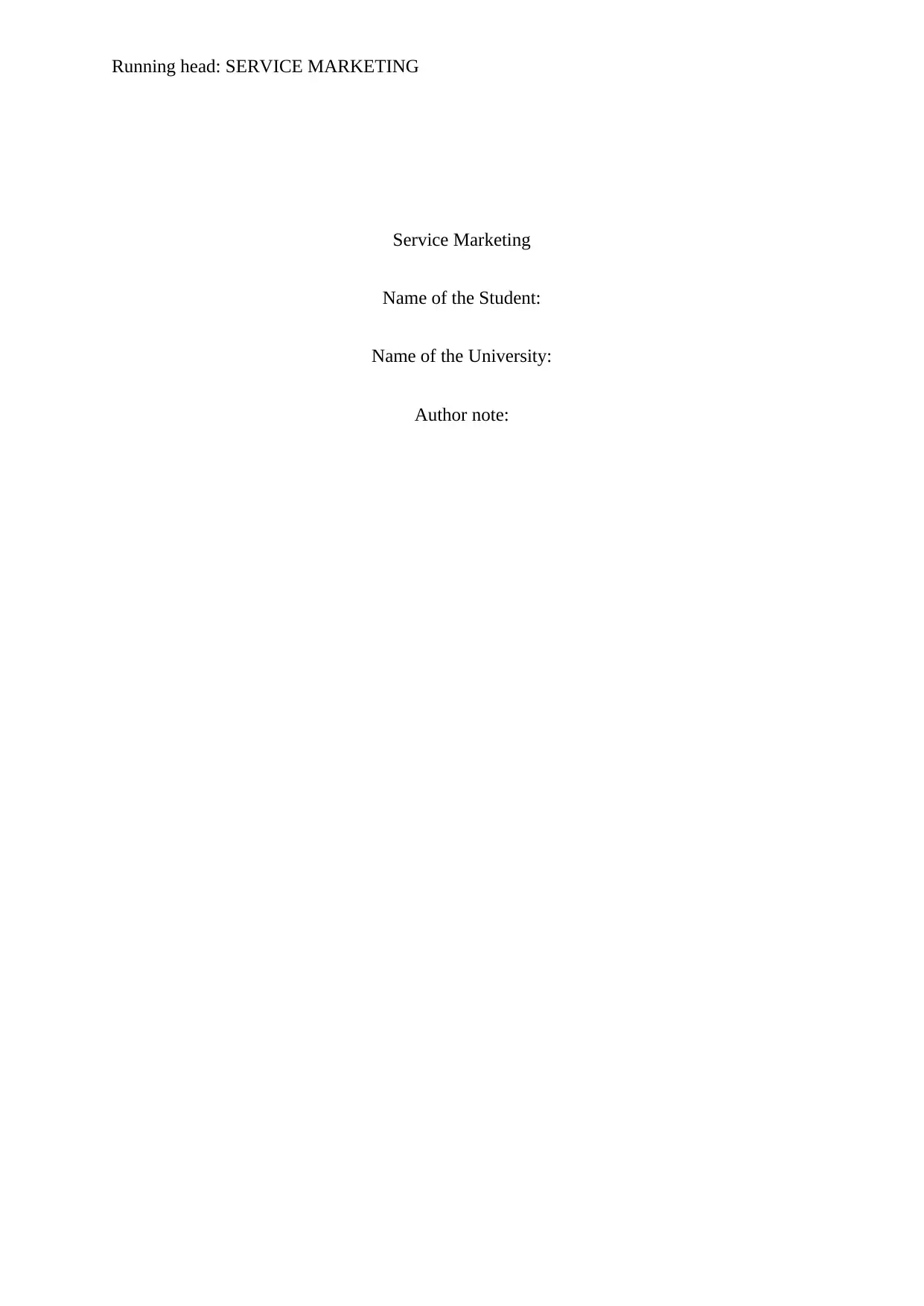
Running head: SERVICE MARKETING
Service Marketing
Name of the Student:
Name of the University:
Author note:
Service Marketing
Name of the Student:
Name of the University:
Author note:
Secure Best Marks with AI Grader
Need help grading? Try our AI Grader for instant feedback on your assignments.
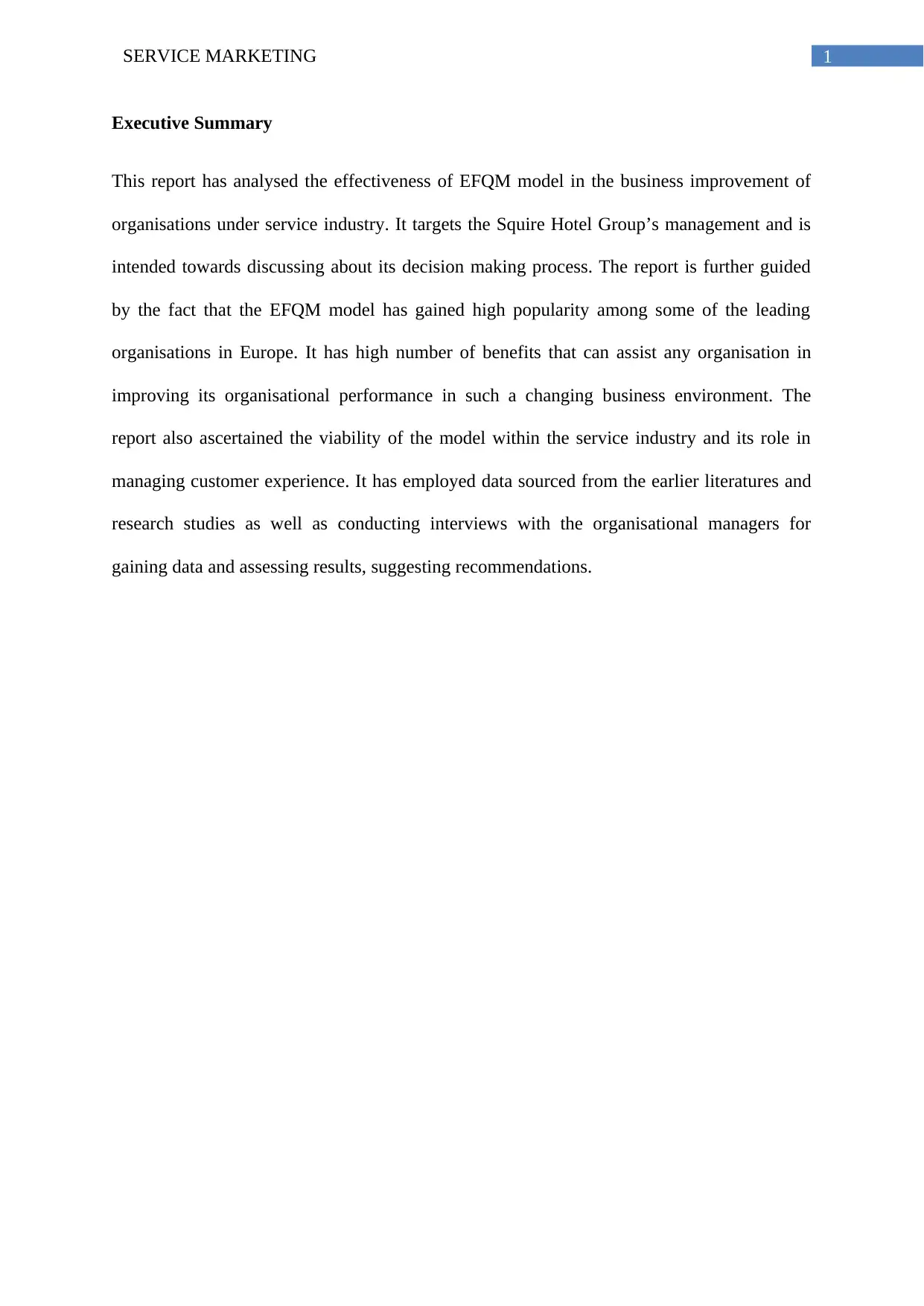
1SERVICE MARKETING
Executive Summary
This report has analysed the effectiveness of EFQM model in the business improvement of
organisations under service industry. It targets the Squire Hotel Group’s management and is
intended towards discussing about its decision making process. The report is further guided
by the fact that the EFQM model has gained high popularity among some of the leading
organisations in Europe. It has high number of benefits that can assist any organisation in
improving its organisational performance in such a changing business environment. The
report also ascertained the viability of the model within the service industry and its role in
managing customer experience. It has employed data sourced from the earlier literatures and
research studies as well as conducting interviews with the organisational managers for
gaining data and assessing results, suggesting recommendations.
Executive Summary
This report has analysed the effectiveness of EFQM model in the business improvement of
organisations under service industry. It targets the Squire Hotel Group’s management and is
intended towards discussing about its decision making process. The report is further guided
by the fact that the EFQM model has gained high popularity among some of the leading
organisations in Europe. It has high number of benefits that can assist any organisation in
improving its organisational performance in such a changing business environment. The
report also ascertained the viability of the model within the service industry and its role in
managing customer experience. It has employed data sourced from the earlier literatures and
research studies as well as conducting interviews with the organisational managers for
gaining data and assessing results, suggesting recommendations.
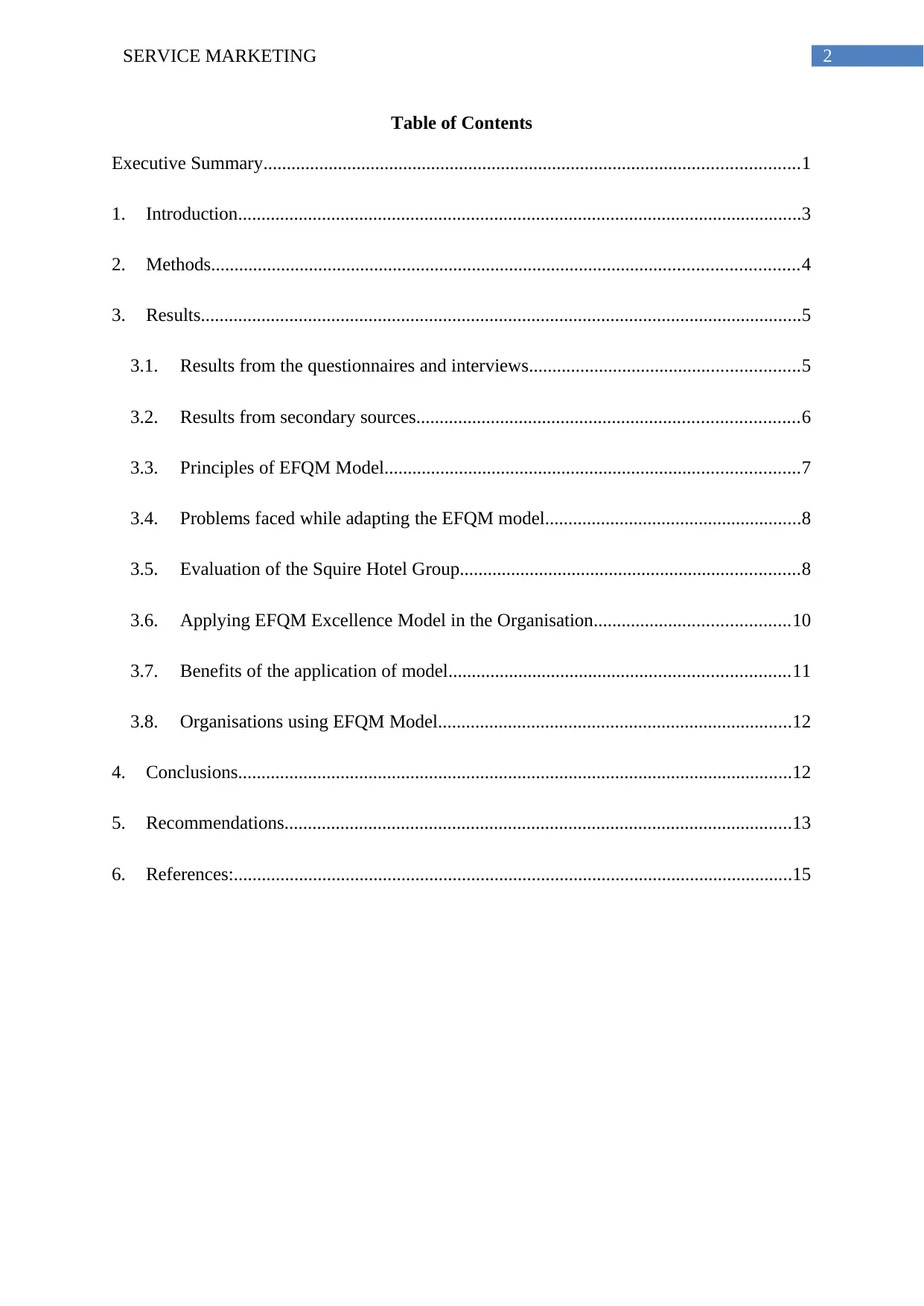
2SERVICE MARKETING
Table of Contents
Executive Summary...................................................................................................................1
1. Introduction.........................................................................................................................3
2. Methods..............................................................................................................................4
3. Results.................................................................................................................................5
3.1. Results from the questionnaires and interviews..........................................................5
3.2. Results from secondary sources..................................................................................6
3.3. Principles of EFQM Model.........................................................................................7
3.4. Problems faced while adapting the EFQM model.......................................................8
3.5. Evaluation of the Squire Hotel Group.........................................................................8
3.6. Applying EFQM Excellence Model in the Organisation..........................................10
3.7. Benefits of the application of model.........................................................................11
3.8. Organisations using EFQM Model............................................................................12
4. Conclusions.......................................................................................................................12
5. Recommendations.............................................................................................................13
6. References:........................................................................................................................15
Table of Contents
Executive Summary...................................................................................................................1
1. Introduction.........................................................................................................................3
2. Methods..............................................................................................................................4
3. Results.................................................................................................................................5
3.1. Results from the questionnaires and interviews..........................................................5
3.2. Results from secondary sources..................................................................................6
3.3. Principles of EFQM Model.........................................................................................7
3.4. Problems faced while adapting the EFQM model.......................................................8
3.5. Evaluation of the Squire Hotel Group.........................................................................8
3.6. Applying EFQM Excellence Model in the Organisation..........................................10
3.7. Benefits of the application of model.........................................................................11
3.8. Organisations using EFQM Model............................................................................12
4. Conclusions.......................................................................................................................12
5. Recommendations.............................................................................................................13
6. References:........................................................................................................................15
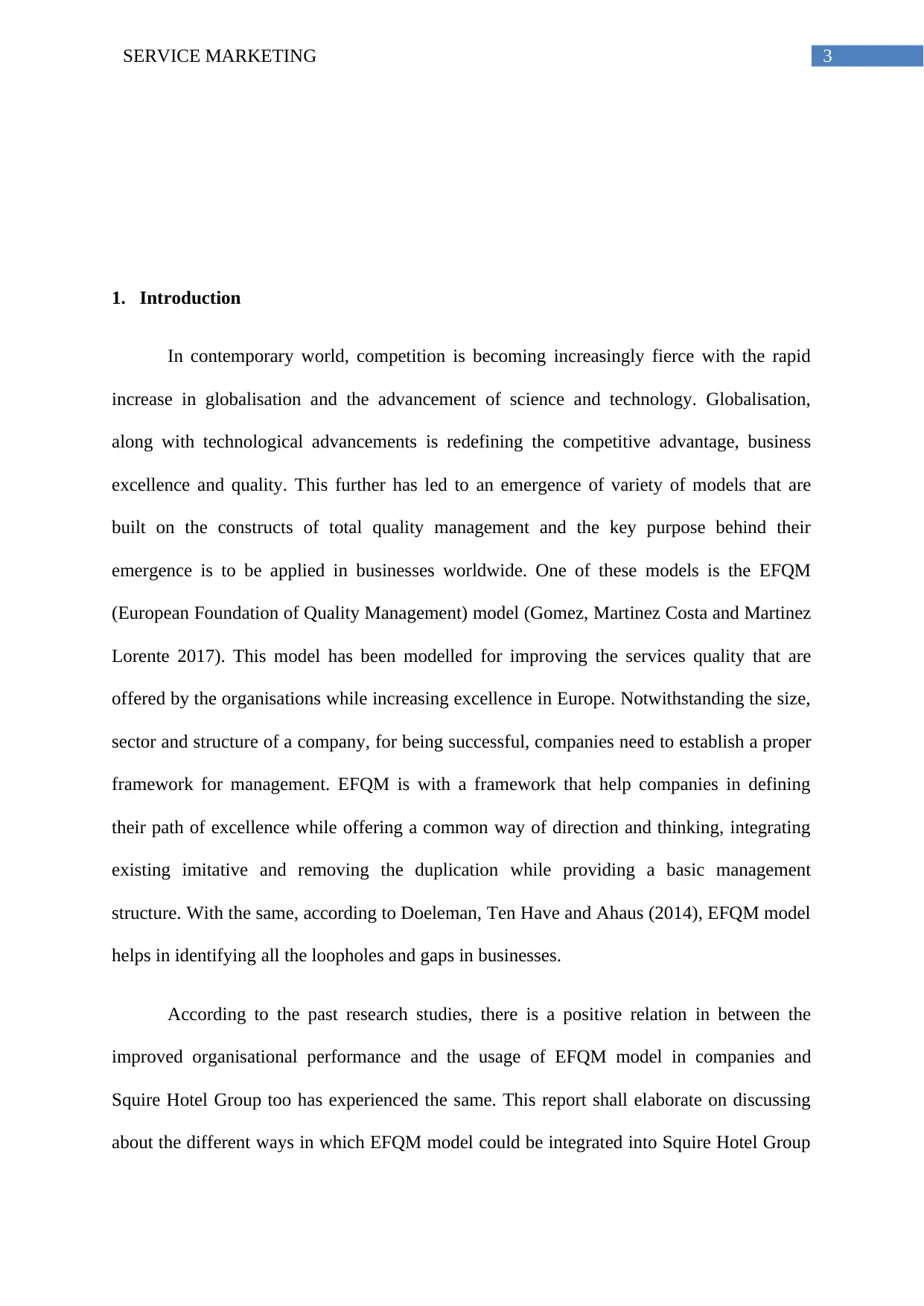
3SERVICE MARKETING
1. Introduction
In contemporary world, competition is becoming increasingly fierce with the rapid
increase in globalisation and the advancement of science and technology. Globalisation,
along with technological advancements is redefining the competitive advantage, business
excellence and quality. This further has led to an emergence of variety of models that are
built on the constructs of total quality management and the key purpose behind their
emergence is to be applied in businesses worldwide. One of these models is the EFQM
(European Foundation of Quality Management) model (Gomez, Martinez Costa and Martinez
Lorente 2017). This model has been modelled for improving the services quality that are
offered by the organisations while increasing excellence in Europe. Notwithstanding the size,
sector and structure of a company, for being successful, companies need to establish a proper
framework for management. EFQM is with a framework that help companies in defining
their path of excellence while offering a common way of direction and thinking, integrating
existing imitative and removing the duplication while providing a basic management
structure. With the same, according to Doeleman, Ten Have and Ahaus (2014), EFQM model
helps in identifying all the loopholes and gaps in businesses.
According to the past research studies, there is a positive relation in between the
improved organisational performance and the usage of EFQM model in companies and
Squire Hotel Group too has experienced the same. This report shall elaborate on discussing
about the different ways in which EFQM model could be integrated into Squire Hotel Group
1. Introduction
In contemporary world, competition is becoming increasingly fierce with the rapid
increase in globalisation and the advancement of science and technology. Globalisation,
along with technological advancements is redefining the competitive advantage, business
excellence and quality. This further has led to an emergence of variety of models that are
built on the constructs of total quality management and the key purpose behind their
emergence is to be applied in businesses worldwide. One of these models is the EFQM
(European Foundation of Quality Management) model (Gomez, Martinez Costa and Martinez
Lorente 2017). This model has been modelled for improving the services quality that are
offered by the organisations while increasing excellence in Europe. Notwithstanding the size,
sector and structure of a company, for being successful, companies need to establish a proper
framework for management. EFQM is with a framework that help companies in defining
their path of excellence while offering a common way of direction and thinking, integrating
existing imitative and removing the duplication while providing a basic management
structure. With the same, according to Doeleman, Ten Have and Ahaus (2014), EFQM model
helps in identifying all the loopholes and gaps in businesses.
According to the past research studies, there is a positive relation in between the
improved organisational performance and the usage of EFQM model in companies and
Squire Hotel Group too has experienced the same. This report shall elaborate on discussing
about the different ways in which EFQM model could be integrated into Squire Hotel Group
Secure Best Marks with AI Grader
Need help grading? Try our AI Grader for instant feedback on your assignments.
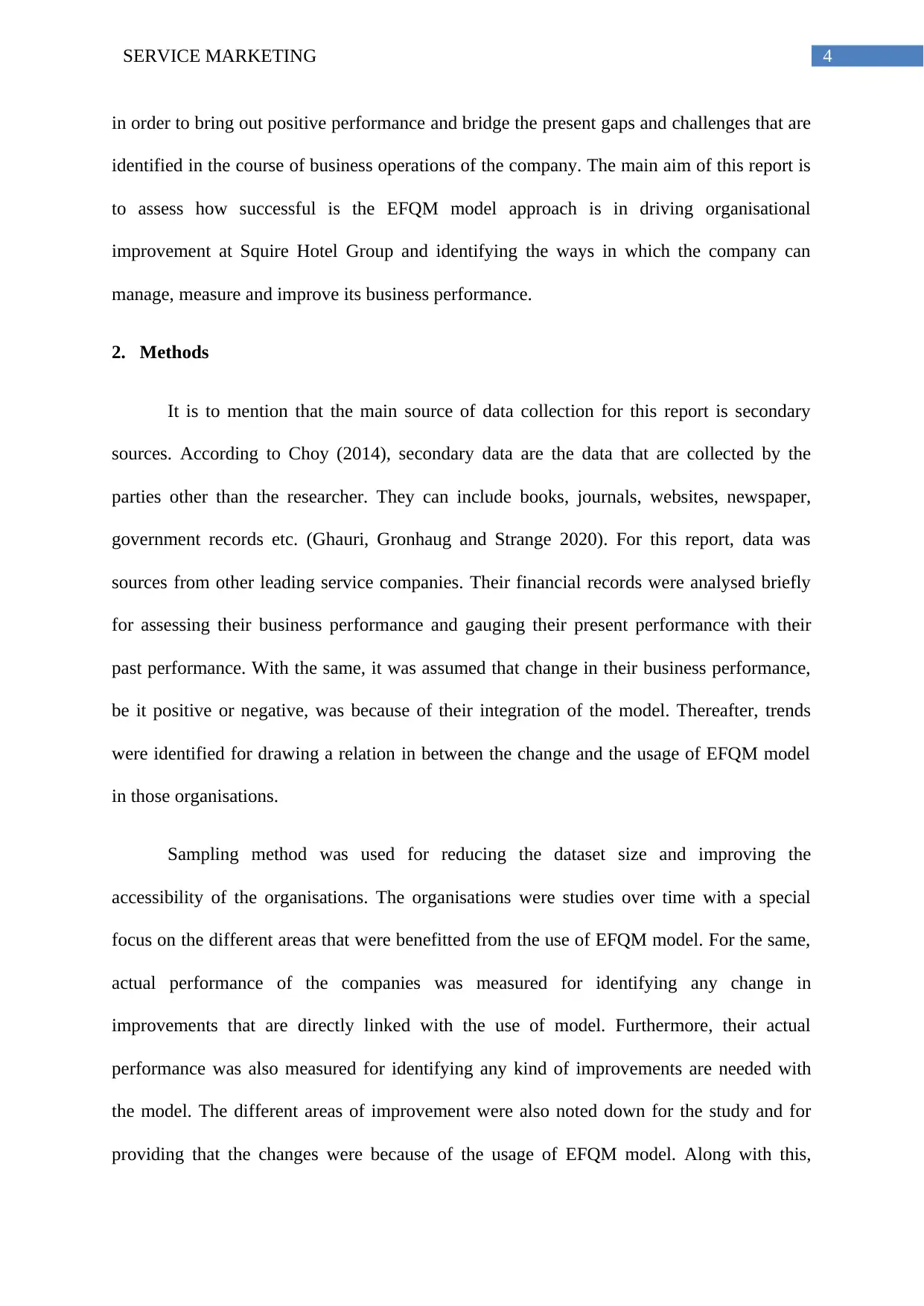
4SERVICE MARKETING
in order to bring out positive performance and bridge the present gaps and challenges that are
identified in the course of business operations of the company. The main aim of this report is
to assess how successful is the EFQM model approach is in driving organisational
improvement at Squire Hotel Group and identifying the ways in which the company can
manage, measure and improve its business performance.
2. Methods
It is to mention that the main source of data collection for this report is secondary
sources. According to Choy (2014), secondary data are the data that are collected by the
parties other than the researcher. They can include books, journals, websites, newspaper,
government records etc. (Ghauri, Gronhaug and Strange 2020). For this report, data was
sources from other leading service companies. Their financial records were analysed briefly
for assessing their business performance and gauging their present performance with their
past performance. With the same, it was assumed that change in their business performance,
be it positive or negative, was because of their integration of the model. Thereafter, trends
were identified for drawing a relation in between the change and the usage of EFQM model
in those organisations.
Sampling method was used for reducing the dataset size and improving the
accessibility of the organisations. The organisations were studies over time with a special
focus on the different areas that were benefitted from the use of EFQM model. For the same,
actual performance of the companies was measured for identifying any change in
improvements that are directly linked with the use of model. Furthermore, their actual
performance was also measured for identifying any kind of improvements are needed with
the model. The different areas of improvement were also noted down for the study and for
providing that the changes were because of the usage of EFQM model. Along with this,
in order to bring out positive performance and bridge the present gaps and challenges that are
identified in the course of business operations of the company. The main aim of this report is
to assess how successful is the EFQM model approach is in driving organisational
improvement at Squire Hotel Group and identifying the ways in which the company can
manage, measure and improve its business performance.
2. Methods
It is to mention that the main source of data collection for this report is secondary
sources. According to Choy (2014), secondary data are the data that are collected by the
parties other than the researcher. They can include books, journals, websites, newspaper,
government records etc. (Ghauri, Gronhaug and Strange 2020). For this report, data was
sources from other leading service companies. Their financial records were analysed briefly
for assessing their business performance and gauging their present performance with their
past performance. With the same, it was assumed that change in their business performance,
be it positive or negative, was because of their integration of the model. Thereafter, trends
were identified for drawing a relation in between the change and the usage of EFQM model
in those organisations.
Sampling method was used for reducing the dataset size and improving the
accessibility of the organisations. The organisations were studies over time with a special
focus on the different areas that were benefitted from the use of EFQM model. For the same,
actual performance of the companies was measured for identifying any change in
improvements that are directly linked with the use of model. Furthermore, their actual
performance was also measured for identifying any kind of improvements are needed with
the model. The different areas of improvement were also noted down for the study and for
providing that the changes were because of the usage of EFQM model. Along with this,
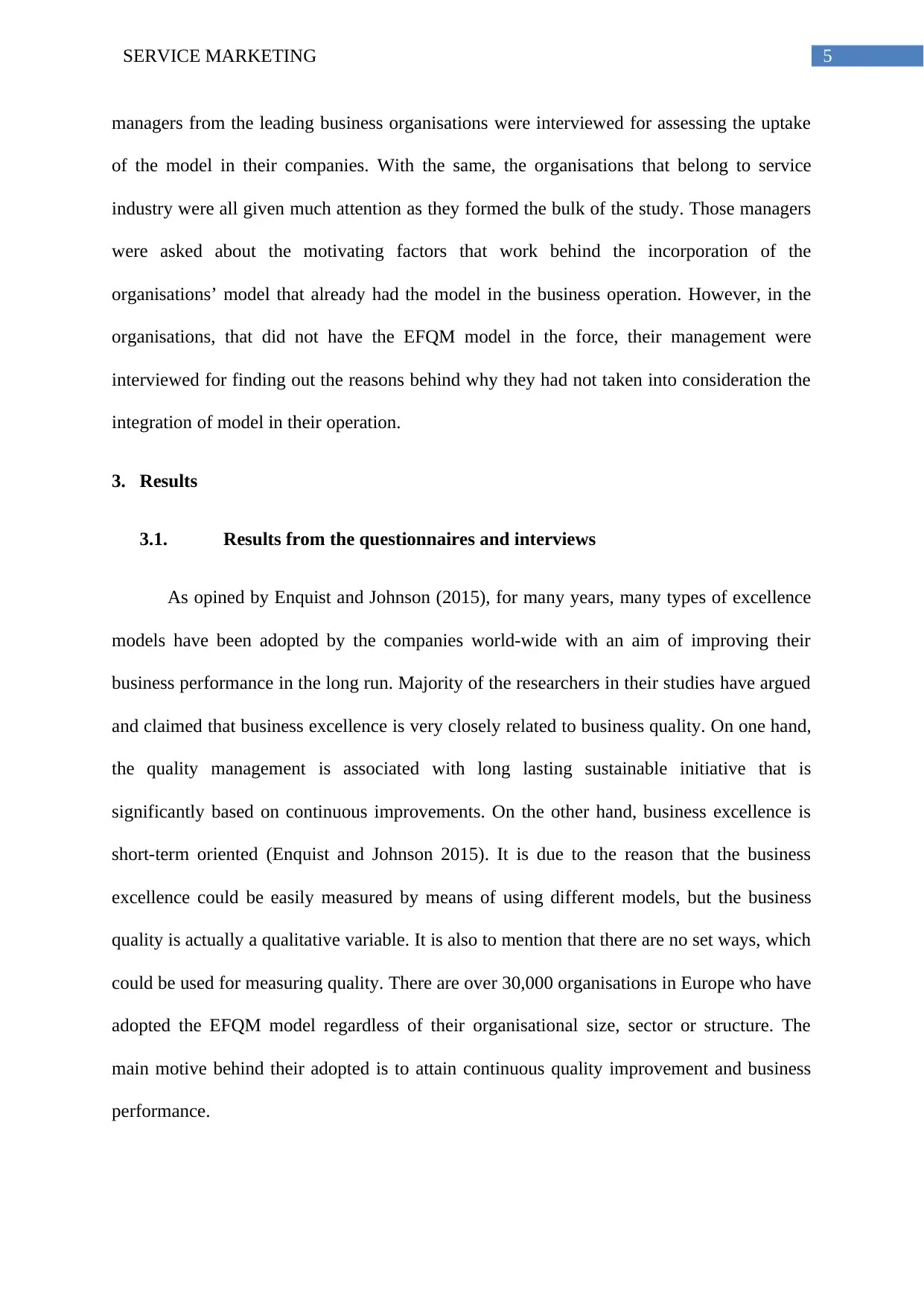
5SERVICE MARKETING
managers from the leading business organisations were interviewed for assessing the uptake
of the model in their companies. With the same, the organisations that belong to service
industry were all given much attention as they formed the bulk of the study. Those managers
were asked about the motivating factors that work behind the incorporation of the
organisations’ model that already had the model in the business operation. However, in the
organisations, that did not have the EFQM model in the force, their management were
interviewed for finding out the reasons behind why they had not taken into consideration the
integration of model in their operation.
3. Results
3.1. Results from the questionnaires and interviews
As opined by Enquist and Johnson (2015), for many years, many types of excellence
models have been adopted by the companies world-wide with an aim of improving their
business performance in the long run. Majority of the researchers in their studies have argued
and claimed that business excellence is very closely related to business quality. On one hand,
the quality management is associated with long lasting sustainable initiative that is
significantly based on continuous improvements. On the other hand, business excellence is
short-term oriented (Enquist and Johnson 2015). It is due to the reason that the business
excellence could be easily measured by means of using different models, but the business
quality is actually a qualitative variable. It is also to mention that there are no set ways, which
could be used for measuring quality. There are over 30,000 organisations in Europe who have
adopted the EFQM model regardless of their organisational size, sector or structure. The
main motive behind their adopted is to attain continuous quality improvement and business
performance.
managers from the leading business organisations were interviewed for assessing the uptake
of the model in their companies. With the same, the organisations that belong to service
industry were all given much attention as they formed the bulk of the study. Those managers
were asked about the motivating factors that work behind the incorporation of the
organisations’ model that already had the model in the business operation. However, in the
organisations, that did not have the EFQM model in the force, their management were
interviewed for finding out the reasons behind why they had not taken into consideration the
integration of model in their operation.
3. Results
3.1. Results from the questionnaires and interviews
As opined by Enquist and Johnson (2015), for many years, many types of excellence
models have been adopted by the companies world-wide with an aim of improving their
business performance in the long run. Majority of the researchers in their studies have argued
and claimed that business excellence is very closely related to business quality. On one hand,
the quality management is associated with long lasting sustainable initiative that is
significantly based on continuous improvements. On the other hand, business excellence is
short-term oriented (Enquist and Johnson 2015). It is due to the reason that the business
excellence could be easily measured by means of using different models, but the business
quality is actually a qualitative variable. It is also to mention that there are no set ways, which
could be used for measuring quality. There are over 30,000 organisations in Europe who have
adopted the EFQM model regardless of their organisational size, sector or structure. The
main motive behind their adopted is to attain continuous quality improvement and business
performance.
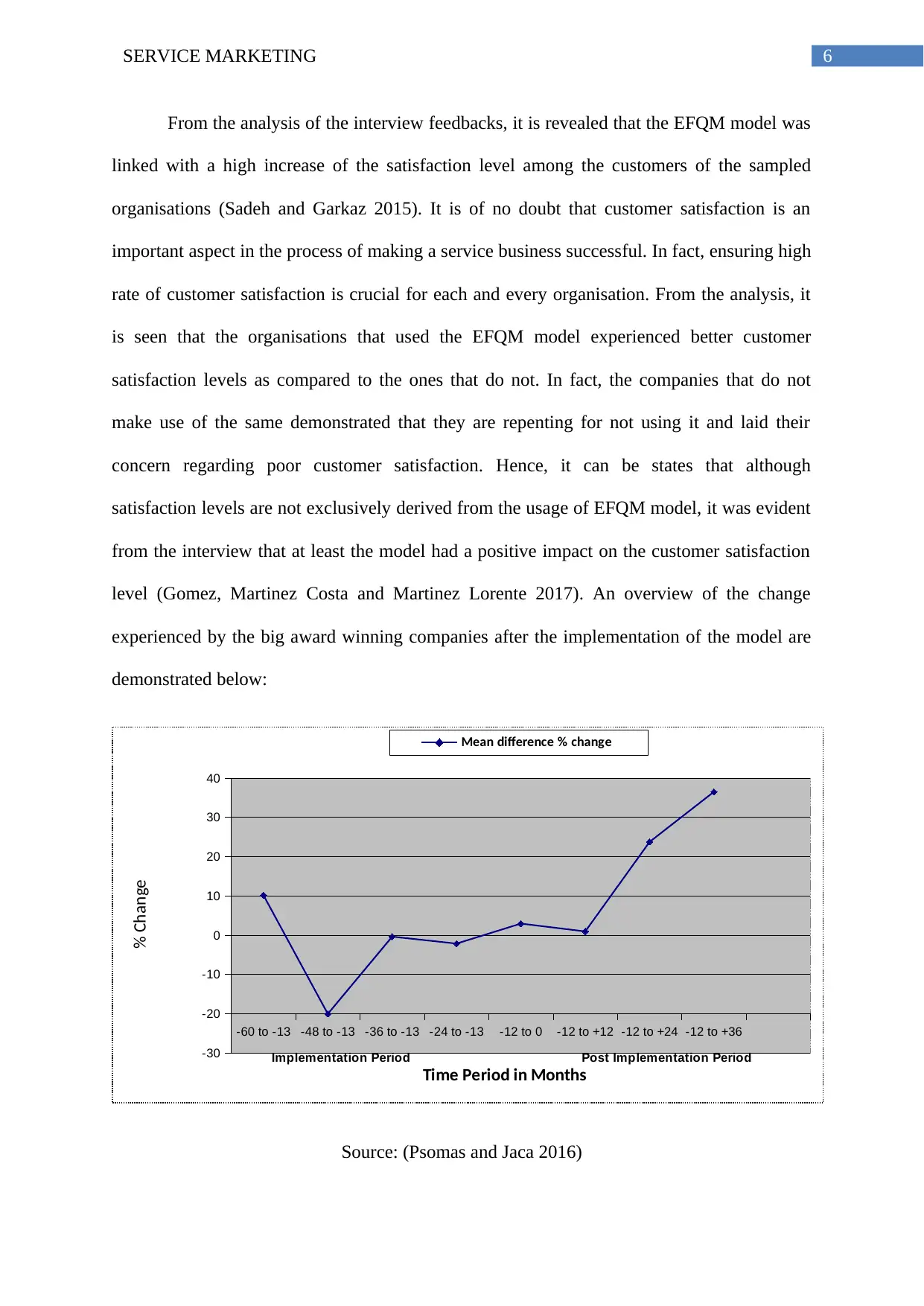
6SERVICE MARKETING
From the analysis of the interview feedbacks, it is revealed that the EFQM model was
linked with a high increase of the satisfaction level among the customers of the sampled
organisations (Sadeh and Garkaz 2015). It is of no doubt that customer satisfaction is an
important aspect in the process of making a service business successful. In fact, ensuring high
rate of customer satisfaction is crucial for each and every organisation. From the analysis, it
is seen that the organisations that used the EFQM model experienced better customer
satisfaction levels as compared to the ones that do not. In fact, the companies that do not
make use of the same demonstrated that they are repenting for not using it and laid their
concern regarding poor customer satisfaction. Hence, it can be states that although
satisfaction levels are not exclusively derived from the usage of EFQM model, it was evident
from the interview that at least the model had a positive impact on the customer satisfaction
level (Gomez, Martinez Costa and Martinez Lorente 2017). An overview of the change
experienced by the big award winning companies after the implementation of the model are
demonstrated below:
-60 to -13 -48 to -13 -36 to -13 -24 to -13 -12 to 0 -12 to +12 -12 to +24 -12 to +36
-30
-20
-10
0
10
20
30
40
Mean difference % change
Time Period in Months
% Change
Implementation Period Post Implementation Period
Source: (Psomas and Jaca 2016)
From the analysis of the interview feedbacks, it is revealed that the EFQM model was
linked with a high increase of the satisfaction level among the customers of the sampled
organisations (Sadeh and Garkaz 2015). It is of no doubt that customer satisfaction is an
important aspect in the process of making a service business successful. In fact, ensuring high
rate of customer satisfaction is crucial for each and every organisation. From the analysis, it
is seen that the organisations that used the EFQM model experienced better customer
satisfaction levels as compared to the ones that do not. In fact, the companies that do not
make use of the same demonstrated that they are repenting for not using it and laid their
concern regarding poor customer satisfaction. Hence, it can be states that although
satisfaction levels are not exclusively derived from the usage of EFQM model, it was evident
from the interview that at least the model had a positive impact on the customer satisfaction
level (Gomez, Martinez Costa and Martinez Lorente 2017). An overview of the change
experienced by the big award winning companies after the implementation of the model are
demonstrated below:
-60 to -13 -48 to -13 -36 to -13 -24 to -13 -12 to 0 -12 to +12 -12 to +24 -12 to +36
-30
-20
-10
0
10
20
30
40
Mean difference % change
Time Period in Months
% Change
Implementation Period Post Implementation Period
Source: (Psomas and Jaca 2016)
Paraphrase This Document
Need a fresh take? Get an instant paraphrase of this document with our AI Paraphraser
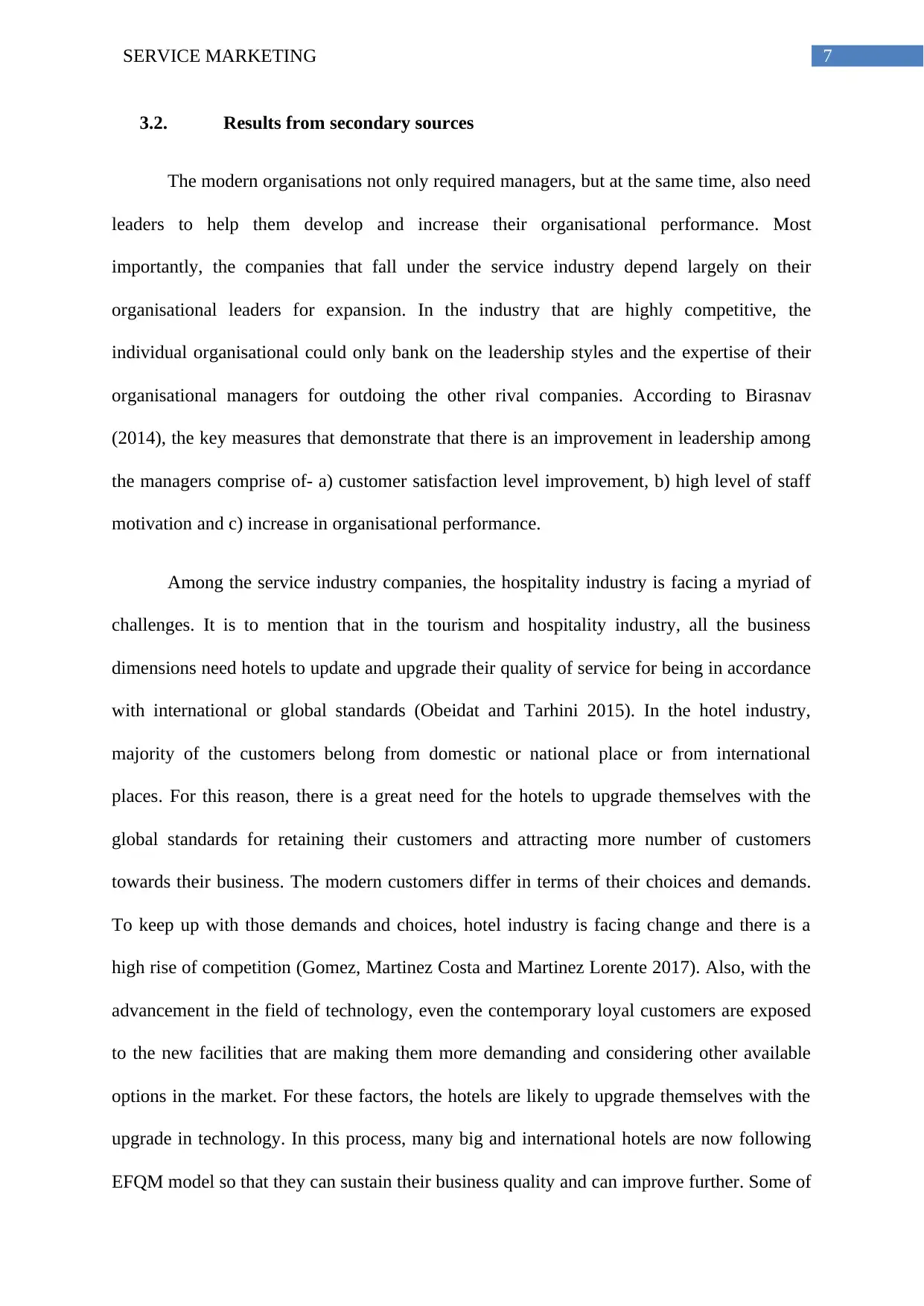
7SERVICE MARKETING
3.2. Results from secondary sources
The modern organisations not only required managers, but at the same time, also need
leaders to help them develop and increase their organisational performance. Most
importantly, the companies that fall under the service industry depend largely on their
organisational leaders for expansion. In the industry that are highly competitive, the
individual organisational could only bank on the leadership styles and the expertise of their
organisational managers for outdoing the other rival companies. According to Birasnav
(2014), the key measures that demonstrate that there is an improvement in leadership among
the managers comprise of- a) customer satisfaction level improvement, b) high level of staff
motivation and c) increase in organisational performance.
Among the service industry companies, the hospitality industry is facing a myriad of
challenges. It is to mention that in the tourism and hospitality industry, all the business
dimensions need hotels to update and upgrade their quality of service for being in accordance
with international or global standards (Obeidat and Tarhini 2015). In the hotel industry,
majority of the customers belong from domestic or national place or from international
places. For this reason, there is a great need for the hotels to upgrade themselves with the
global standards for retaining their customers and attracting more number of customers
towards their business. The modern customers differ in terms of their choices and demands.
To keep up with those demands and choices, hotel industry is facing change and there is a
high rise of competition (Gomez, Martinez Costa and Martinez Lorente 2017). Also, with the
advancement in the field of technology, even the contemporary loyal customers are exposed
to the new facilities that are making them more demanding and considering other available
options in the market. For these factors, the hotels are likely to upgrade themselves with the
upgrade in technology. In this process, many big and international hotels are now following
EFQM model so that they can sustain their business quality and can improve further. Some of
3.2. Results from secondary sources
The modern organisations not only required managers, but at the same time, also need
leaders to help them develop and increase their organisational performance. Most
importantly, the companies that fall under the service industry depend largely on their
organisational leaders for expansion. In the industry that are highly competitive, the
individual organisational could only bank on the leadership styles and the expertise of their
organisational managers for outdoing the other rival companies. According to Birasnav
(2014), the key measures that demonstrate that there is an improvement in leadership among
the managers comprise of- a) customer satisfaction level improvement, b) high level of staff
motivation and c) increase in organisational performance.
Among the service industry companies, the hospitality industry is facing a myriad of
challenges. It is to mention that in the tourism and hospitality industry, all the business
dimensions need hotels to update and upgrade their quality of service for being in accordance
with international or global standards (Obeidat and Tarhini 2015). In the hotel industry,
majority of the customers belong from domestic or national place or from international
places. For this reason, there is a great need for the hotels to upgrade themselves with the
global standards for retaining their customers and attracting more number of customers
towards their business. The modern customers differ in terms of their choices and demands.
To keep up with those demands and choices, hotel industry is facing change and there is a
high rise of competition (Gomez, Martinez Costa and Martinez Lorente 2017). Also, with the
advancement in the field of technology, even the contemporary loyal customers are exposed
to the new facilities that are making them more demanding and considering other available
options in the market. For these factors, the hotels are likely to upgrade themselves with the
upgrade in technology. In this process, many big and international hotels are now following
EFQM model so that they can sustain their business quality and can improve further. Some of
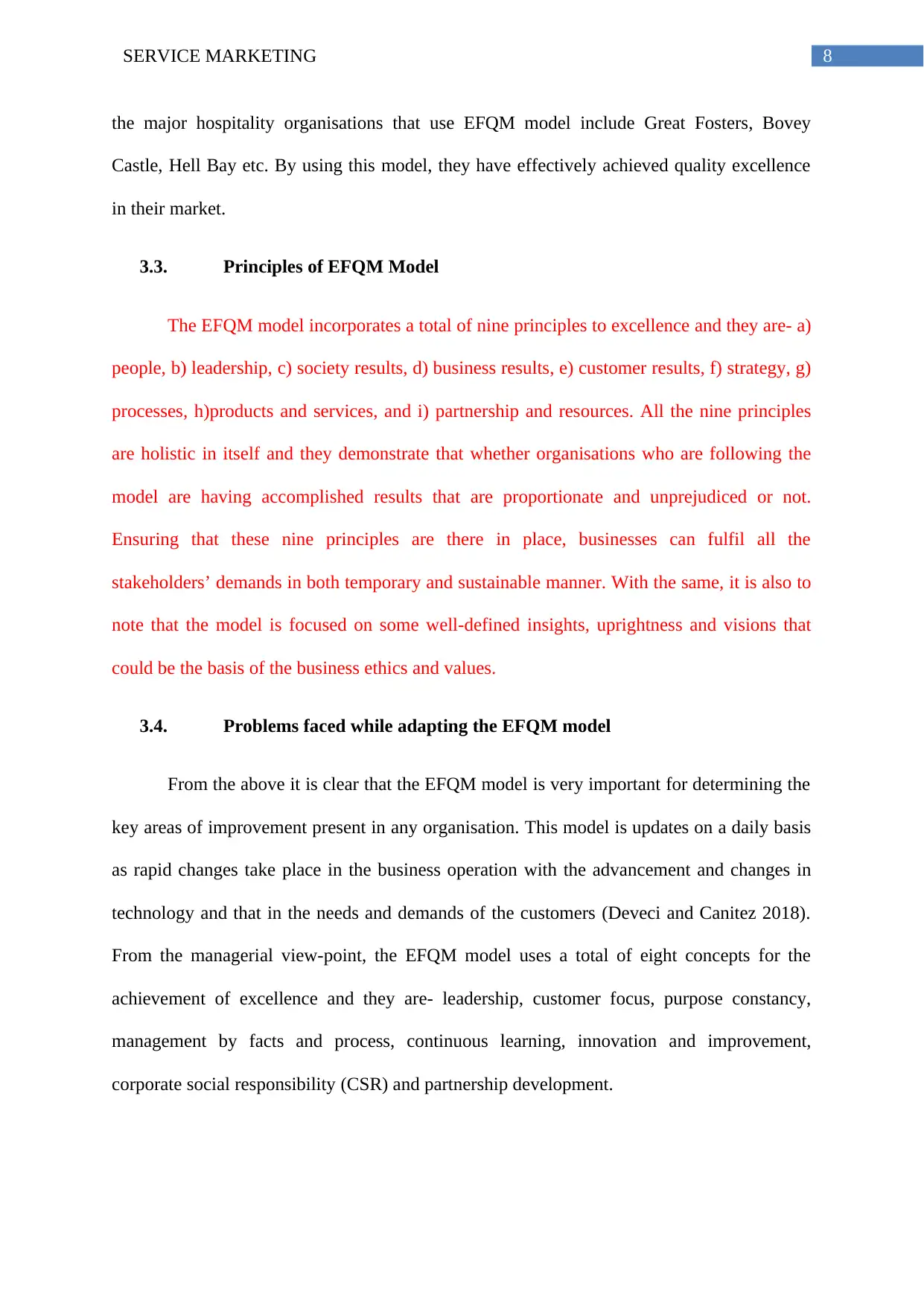
8SERVICE MARKETING
the major hospitality organisations that use EFQM model include Great Fosters, Bovey
Castle, Hell Bay etc. By using this model, they have effectively achieved quality excellence
in their market.
3.3. Principles of EFQM Model
The EFQM model incorporates a total of nine principles to excellence and they are- a)
people, b) leadership, c) society results, d) business results, e) customer results, f) strategy, g)
processes, h)products and services, and i) partnership and resources. All the nine principles
are holistic in itself and they demonstrate that whether organisations who are following the
model are having accomplished results that are proportionate and unprejudiced or not.
Ensuring that these nine principles are there in place, businesses can fulfil all the
stakeholders’ demands in both temporary and sustainable manner. With the same, it is also to
note that the model is focused on some well-defined insights, uprightness and visions that
could be the basis of the business ethics and values.
3.4. Problems faced while adapting the EFQM model
From the above it is clear that the EFQM model is very important for determining the
key areas of improvement present in any organisation. This model is updates on a daily basis
as rapid changes take place in the business operation with the advancement and changes in
technology and that in the needs and demands of the customers (Deveci and Canitez 2018).
From the managerial view-point, the EFQM model uses a total of eight concepts for the
achievement of excellence and they are- leadership, customer focus, purpose constancy,
management by facts and process, continuous learning, innovation and improvement,
corporate social responsibility (CSR) and partnership development.
the major hospitality organisations that use EFQM model include Great Fosters, Bovey
Castle, Hell Bay etc. By using this model, they have effectively achieved quality excellence
in their market.
3.3. Principles of EFQM Model
The EFQM model incorporates a total of nine principles to excellence and they are- a)
people, b) leadership, c) society results, d) business results, e) customer results, f) strategy, g)
processes, h)products and services, and i) partnership and resources. All the nine principles
are holistic in itself and they demonstrate that whether organisations who are following the
model are having accomplished results that are proportionate and unprejudiced or not.
Ensuring that these nine principles are there in place, businesses can fulfil all the
stakeholders’ demands in both temporary and sustainable manner. With the same, it is also to
note that the model is focused on some well-defined insights, uprightness and visions that
could be the basis of the business ethics and values.
3.4. Problems faced while adapting the EFQM model
From the above it is clear that the EFQM model is very important for determining the
key areas of improvement present in any organisation. This model is updates on a daily basis
as rapid changes take place in the business operation with the advancement and changes in
technology and that in the needs and demands of the customers (Deveci and Canitez 2018).
From the managerial view-point, the EFQM model uses a total of eight concepts for the
achievement of excellence and they are- leadership, customer focus, purpose constancy,
management by facts and process, continuous learning, innovation and improvement,
corporate social responsibility (CSR) and partnership development.
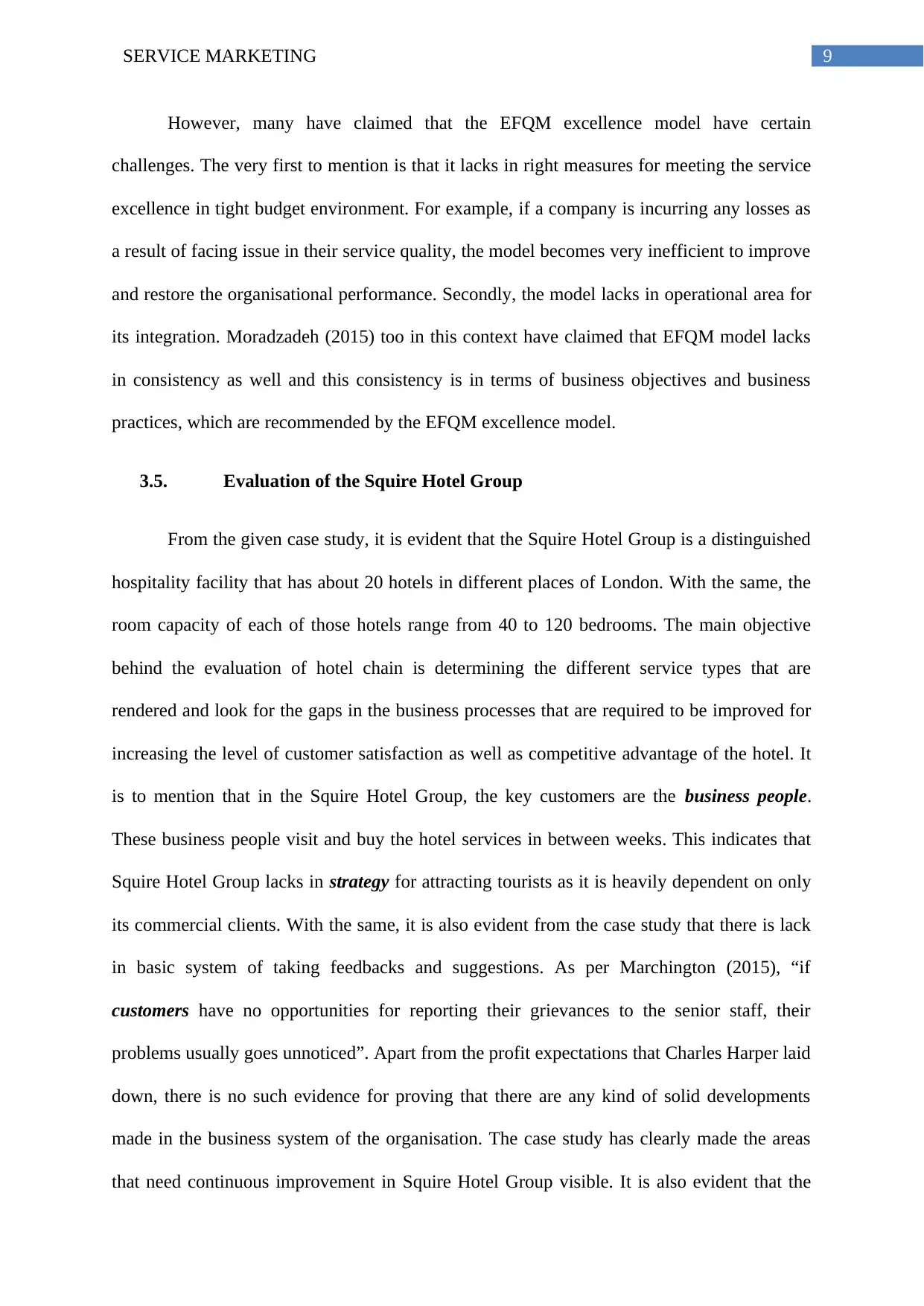
9SERVICE MARKETING
However, many have claimed that the EFQM excellence model have certain
challenges. The very first to mention is that it lacks in right measures for meeting the service
excellence in tight budget environment. For example, if a company is incurring any losses as
a result of facing issue in their service quality, the model becomes very inefficient to improve
and restore the organisational performance. Secondly, the model lacks in operational area for
its integration. Moradzadeh (2015) too in this context have claimed that EFQM model lacks
in consistency as well and this consistency is in terms of business objectives and business
practices, which are recommended by the EFQM excellence model.
3.5. Evaluation of the Squire Hotel Group
From the given case study, it is evident that the Squire Hotel Group is a distinguished
hospitality facility that has about 20 hotels in different places of London. With the same, the
room capacity of each of those hotels range from 40 to 120 bedrooms. The main objective
behind the evaluation of hotel chain is determining the different service types that are
rendered and look for the gaps in the business processes that are required to be improved for
increasing the level of customer satisfaction as well as competitive advantage of the hotel. It
is to mention that in the Squire Hotel Group, the key customers are the business people.
These business people visit and buy the hotel services in between weeks. This indicates that
Squire Hotel Group lacks in strategy for attracting tourists as it is heavily dependent on only
its commercial clients. With the same, it is also evident from the case study that there is lack
in basic system of taking feedbacks and suggestions. As per Marchington (2015), “if
customers have no opportunities for reporting their grievances to the senior staff, their
problems usually goes unnoticed”. Apart from the profit expectations that Charles Harper laid
down, there is no such evidence for proving that there are any kind of solid developments
made in the business system of the organisation. The case study has clearly made the areas
that need continuous improvement in Squire Hotel Group visible. It is also evident that the
However, many have claimed that the EFQM excellence model have certain
challenges. The very first to mention is that it lacks in right measures for meeting the service
excellence in tight budget environment. For example, if a company is incurring any losses as
a result of facing issue in their service quality, the model becomes very inefficient to improve
and restore the organisational performance. Secondly, the model lacks in operational area for
its integration. Moradzadeh (2015) too in this context have claimed that EFQM model lacks
in consistency as well and this consistency is in terms of business objectives and business
practices, which are recommended by the EFQM excellence model.
3.5. Evaluation of the Squire Hotel Group
From the given case study, it is evident that the Squire Hotel Group is a distinguished
hospitality facility that has about 20 hotels in different places of London. With the same, the
room capacity of each of those hotels range from 40 to 120 bedrooms. The main objective
behind the evaluation of hotel chain is determining the different service types that are
rendered and look for the gaps in the business processes that are required to be improved for
increasing the level of customer satisfaction as well as competitive advantage of the hotel. It
is to mention that in the Squire Hotel Group, the key customers are the business people.
These business people visit and buy the hotel services in between weeks. This indicates that
Squire Hotel Group lacks in strategy for attracting tourists as it is heavily dependent on only
its commercial clients. With the same, it is also evident from the case study that there is lack
in basic system of taking feedbacks and suggestions. As per Marchington (2015), “if
customers have no opportunities for reporting their grievances to the senior staff, their
problems usually goes unnoticed”. Apart from the profit expectations that Charles Harper laid
down, there is no such evidence for proving that there are any kind of solid developments
made in the business system of the organisation. The case study has clearly made the areas
that need continuous improvement in Squire Hotel Group visible. It is also evident that the
Secure Best Marks with AI Grader
Need help grading? Try our AI Grader for instant feedback on your assignments.
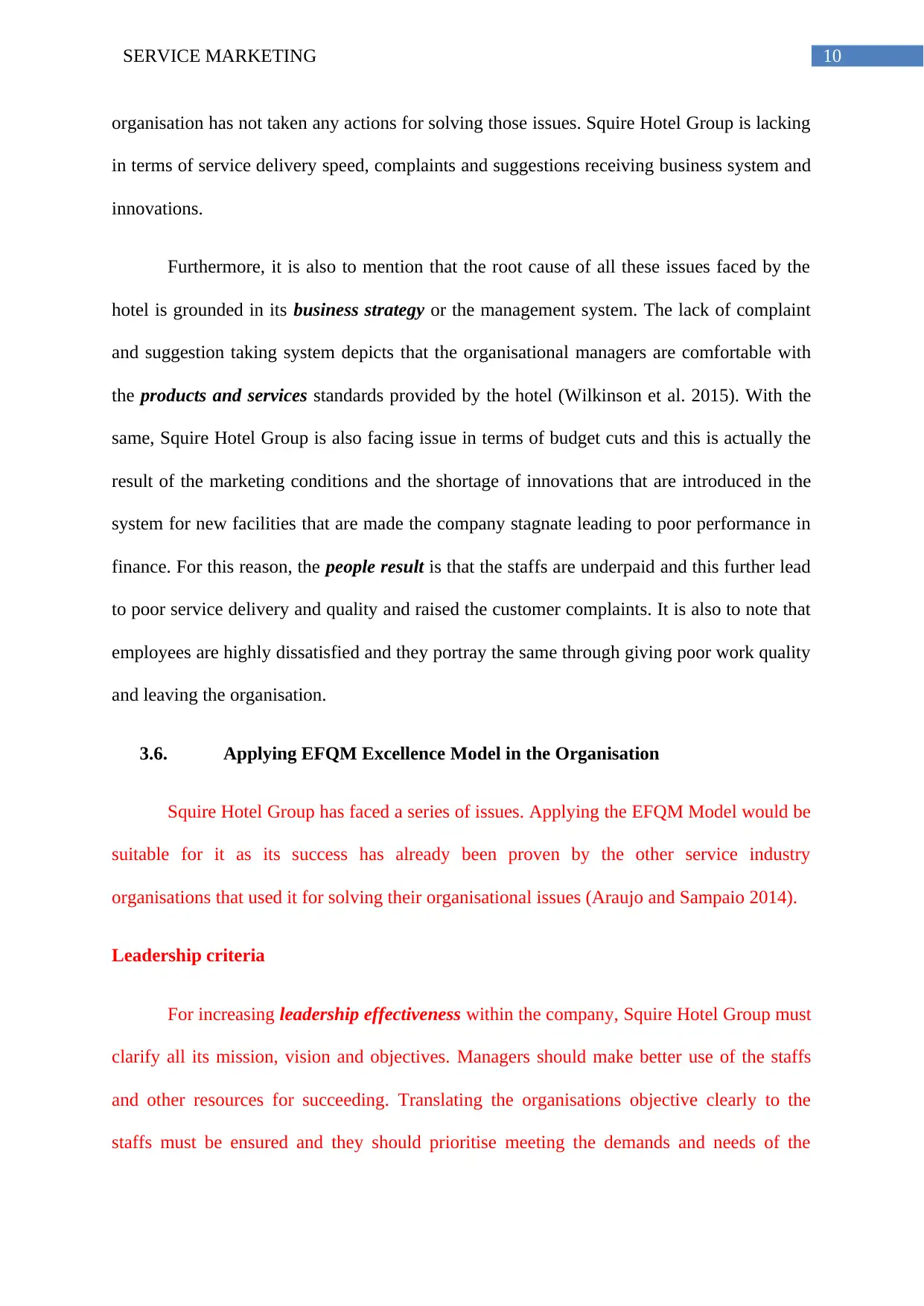
10SERVICE MARKETING
organisation has not taken any actions for solving those issues. Squire Hotel Group is lacking
in terms of service delivery speed, complaints and suggestions receiving business system and
innovations.
Furthermore, it is also to mention that the root cause of all these issues faced by the
hotel is grounded in its business strategy or the management system. The lack of complaint
and suggestion taking system depicts that the organisational managers are comfortable with
the products and services standards provided by the hotel (Wilkinson et al. 2015). With the
same, Squire Hotel Group is also facing issue in terms of budget cuts and this is actually the
result of the marketing conditions and the shortage of innovations that are introduced in the
system for new facilities that are made the company stagnate leading to poor performance in
finance. For this reason, the people result is that the staffs are underpaid and this further lead
to poor service delivery and quality and raised the customer complaints. It is also to note that
employees are highly dissatisfied and they portray the same through giving poor work quality
and leaving the organisation.
3.6. Applying EFQM Excellence Model in the Organisation
Squire Hotel Group has faced a series of issues. Applying the EFQM Model would be
suitable for it as its success has already been proven by the other service industry
organisations that used it for solving their organisational issues (Araujo and Sampaio 2014).
Leadership criteria
For increasing leadership effectiveness within the company, Squire Hotel Group must
clarify all its mission, vision and objectives. Managers should make better use of the staffs
and other resources for succeeding. Translating the organisations objective clearly to the
staffs must be ensured and they should prioritise meeting the demands and needs of the
organisation has not taken any actions for solving those issues. Squire Hotel Group is lacking
in terms of service delivery speed, complaints and suggestions receiving business system and
innovations.
Furthermore, it is also to mention that the root cause of all these issues faced by the
hotel is grounded in its business strategy or the management system. The lack of complaint
and suggestion taking system depicts that the organisational managers are comfortable with
the products and services standards provided by the hotel (Wilkinson et al. 2015). With the
same, Squire Hotel Group is also facing issue in terms of budget cuts and this is actually the
result of the marketing conditions and the shortage of innovations that are introduced in the
system for new facilities that are made the company stagnate leading to poor performance in
finance. For this reason, the people result is that the staffs are underpaid and this further lead
to poor service delivery and quality and raised the customer complaints. It is also to note that
employees are highly dissatisfied and they portray the same through giving poor work quality
and leaving the organisation.
3.6. Applying EFQM Excellence Model in the Organisation
Squire Hotel Group has faced a series of issues. Applying the EFQM Model would be
suitable for it as its success has already been proven by the other service industry
organisations that used it for solving their organisational issues (Araujo and Sampaio 2014).
Leadership criteria
For increasing leadership effectiveness within the company, Squire Hotel Group must
clarify all its mission, vision and objectives. Managers should make better use of the staffs
and other resources for succeeding. Translating the organisations objective clearly to the
staffs must be ensured and they should prioritise meeting the demands and needs of the
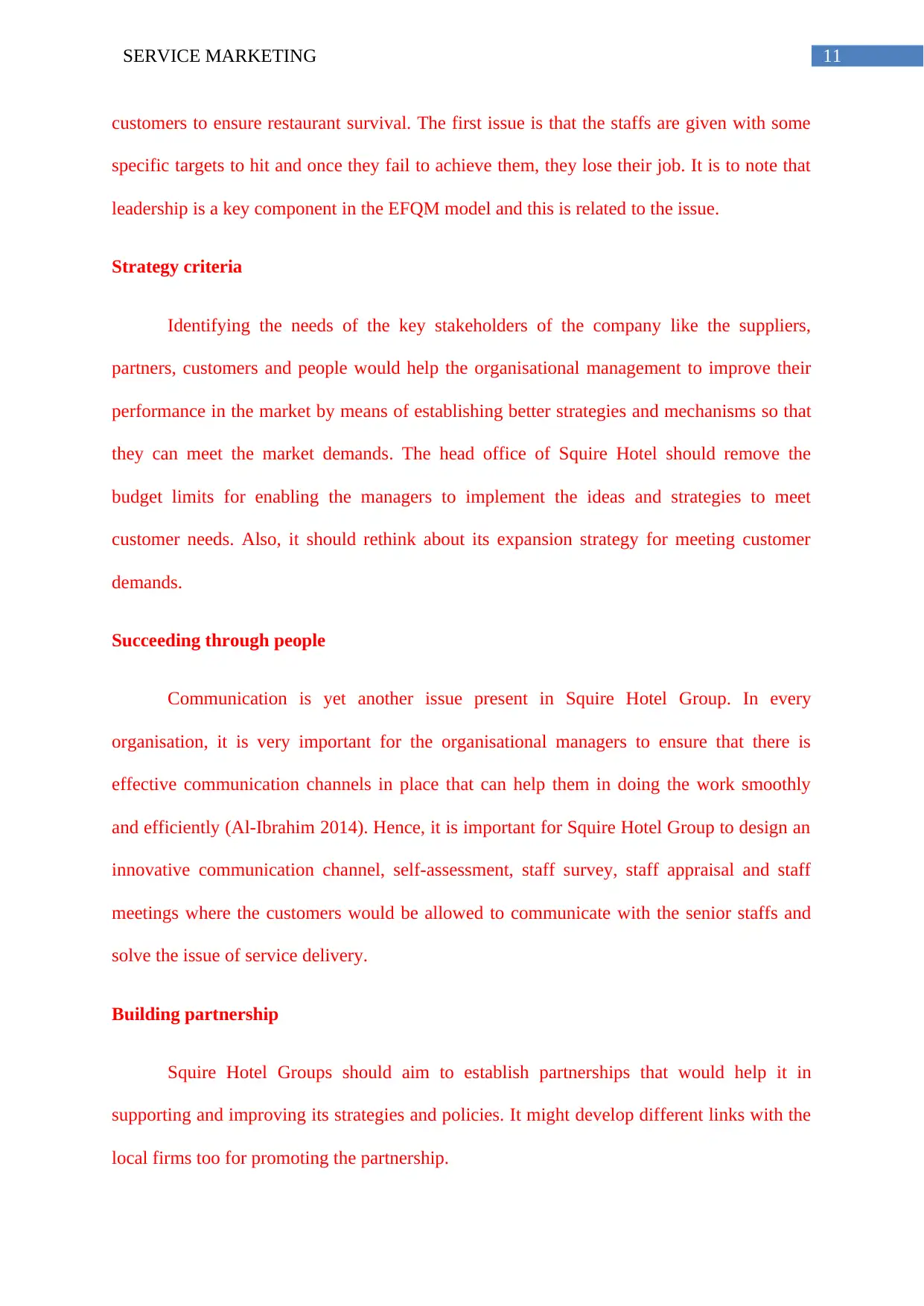
11SERVICE MARKETING
customers to ensure restaurant survival. The first issue is that the staffs are given with some
specific targets to hit and once they fail to achieve them, they lose their job. It is to note that
leadership is a key component in the EFQM model and this is related to the issue.
Strategy criteria
Identifying the needs of the key stakeholders of the company like the suppliers,
partners, customers and people would help the organisational management to improve their
performance in the market by means of establishing better strategies and mechanisms so that
they can meet the market demands. The head office of Squire Hotel should remove the
budget limits for enabling the managers to implement the ideas and strategies to meet
customer needs. Also, it should rethink about its expansion strategy for meeting customer
demands.
Succeeding through people
Communication is yet another issue present in Squire Hotel Group. In every
organisation, it is very important for the organisational managers to ensure that there is
effective communication channels in place that can help them in doing the work smoothly
and efficiently (Al-Ibrahim 2014). Hence, it is important for Squire Hotel Group to design an
innovative communication channel, self-assessment, staff survey, staff appraisal and staff
meetings where the customers would be allowed to communicate with the senior staffs and
solve the issue of service delivery.
Building partnership
Squire Hotel Groups should aim to establish partnerships that would help it in
supporting and improving its strategies and policies. It might develop different links with the
local firms too for promoting the partnership.
customers to ensure restaurant survival. The first issue is that the staffs are given with some
specific targets to hit and once they fail to achieve them, they lose their job. It is to note that
leadership is a key component in the EFQM model and this is related to the issue.
Strategy criteria
Identifying the needs of the key stakeholders of the company like the suppliers,
partners, customers and people would help the organisational management to improve their
performance in the market by means of establishing better strategies and mechanisms so that
they can meet the market demands. The head office of Squire Hotel should remove the
budget limits for enabling the managers to implement the ideas and strategies to meet
customer needs. Also, it should rethink about its expansion strategy for meeting customer
demands.
Succeeding through people
Communication is yet another issue present in Squire Hotel Group. In every
organisation, it is very important for the organisational managers to ensure that there is
effective communication channels in place that can help them in doing the work smoothly
and efficiently (Al-Ibrahim 2014). Hence, it is important for Squire Hotel Group to design an
innovative communication channel, self-assessment, staff survey, staff appraisal and staff
meetings where the customers would be allowed to communicate with the senior staffs and
solve the issue of service delivery.
Building partnership
Squire Hotel Groups should aim to establish partnerships that would help it in
supporting and improving its strategies and policies. It might develop different links with the
local firms too for promoting the partnership.
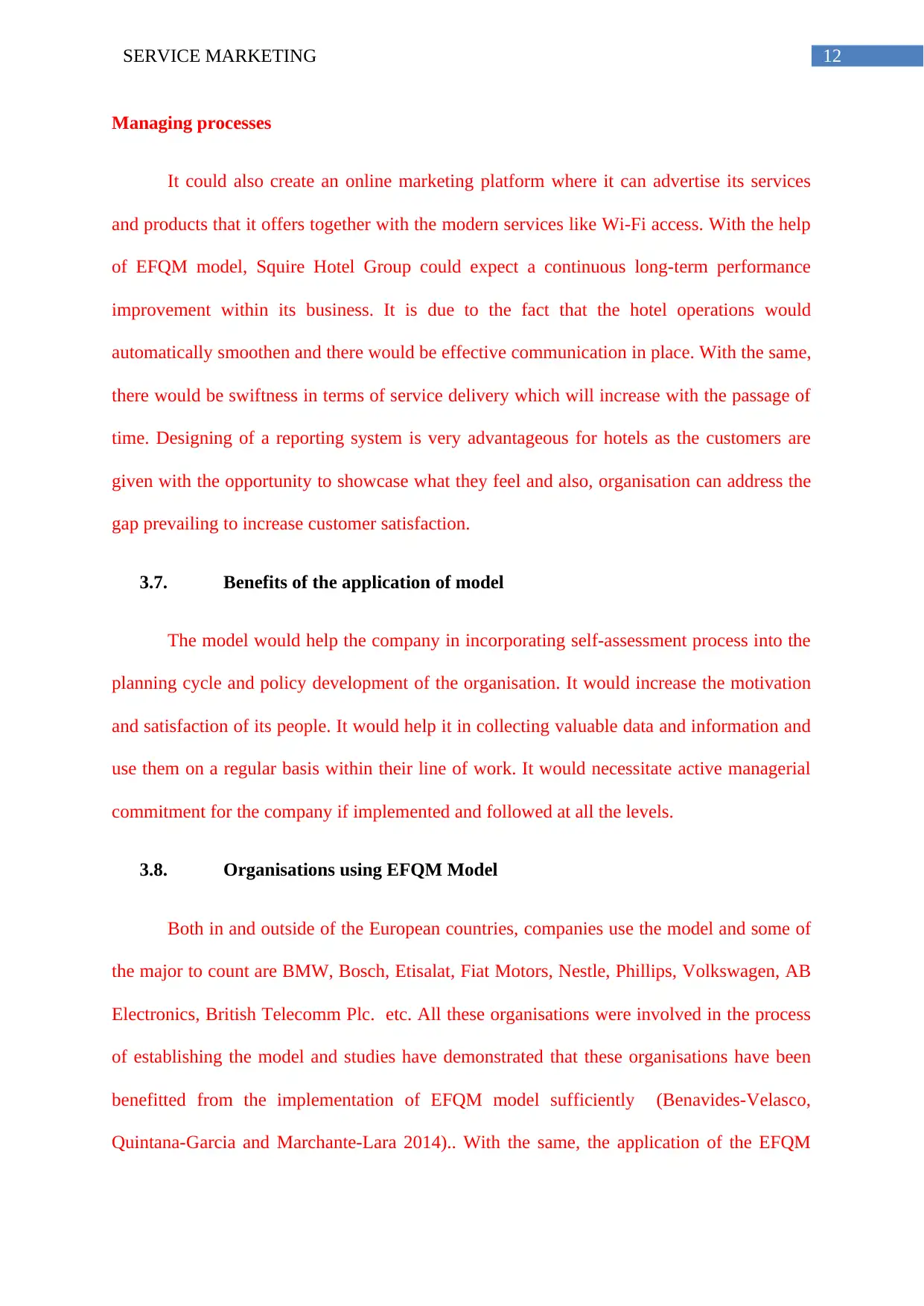
12SERVICE MARKETING
Managing processes
It could also create an online marketing platform where it can advertise its services
and products that it offers together with the modern services like Wi-Fi access. With the help
of EFQM model, Squire Hotel Group could expect a continuous long-term performance
improvement within its business. It is due to the fact that the hotel operations would
automatically smoothen and there would be effective communication in place. With the same,
there would be swiftness in terms of service delivery which will increase with the passage of
time. Designing of a reporting system is very advantageous for hotels as the customers are
given with the opportunity to showcase what they feel and also, organisation can address the
gap prevailing to increase customer satisfaction.
3.7. Benefits of the application of model
The model would help the company in incorporating self-assessment process into the
planning cycle and policy development of the organisation. It would increase the motivation
and satisfaction of its people. It would help it in collecting valuable data and information and
use them on a regular basis within their line of work. It would necessitate active managerial
commitment for the company if implemented and followed at all the levels.
3.8. Organisations using EFQM Model
Both in and outside of the European countries, companies use the model and some of
the major to count are BMW, Bosch, Etisalat, Fiat Motors, Nestle, Phillips, Volkswagen, AB
Electronics, British Telecomm Plc. etc. All these organisations were involved in the process
of establishing the model and studies have demonstrated that these organisations have been
benefitted from the implementation of EFQM model sufficiently (Benavides-Velasco,
Quintana-Garcia and Marchante-Lara 2014).. With the same, the application of the EFQM
Managing processes
It could also create an online marketing platform where it can advertise its services
and products that it offers together with the modern services like Wi-Fi access. With the help
of EFQM model, Squire Hotel Group could expect a continuous long-term performance
improvement within its business. It is due to the fact that the hotel operations would
automatically smoothen and there would be effective communication in place. With the same,
there would be swiftness in terms of service delivery which will increase with the passage of
time. Designing of a reporting system is very advantageous for hotels as the customers are
given with the opportunity to showcase what they feel and also, organisation can address the
gap prevailing to increase customer satisfaction.
3.7. Benefits of the application of model
The model would help the company in incorporating self-assessment process into the
planning cycle and policy development of the organisation. It would increase the motivation
and satisfaction of its people. It would help it in collecting valuable data and information and
use them on a regular basis within their line of work. It would necessitate active managerial
commitment for the company if implemented and followed at all the levels.
3.8. Organisations using EFQM Model
Both in and outside of the European countries, companies use the model and some of
the major to count are BMW, Bosch, Etisalat, Fiat Motors, Nestle, Phillips, Volkswagen, AB
Electronics, British Telecomm Plc. etc. All these organisations were involved in the process
of establishing the model and studies have demonstrated that these organisations have been
benefitted from the implementation of EFQM model sufficiently (Benavides-Velasco,
Quintana-Garcia and Marchante-Lara 2014).. With the same, the application of the EFQM
Paraphrase This Document
Need a fresh take? Get an instant paraphrase of this document with our AI Paraphraser
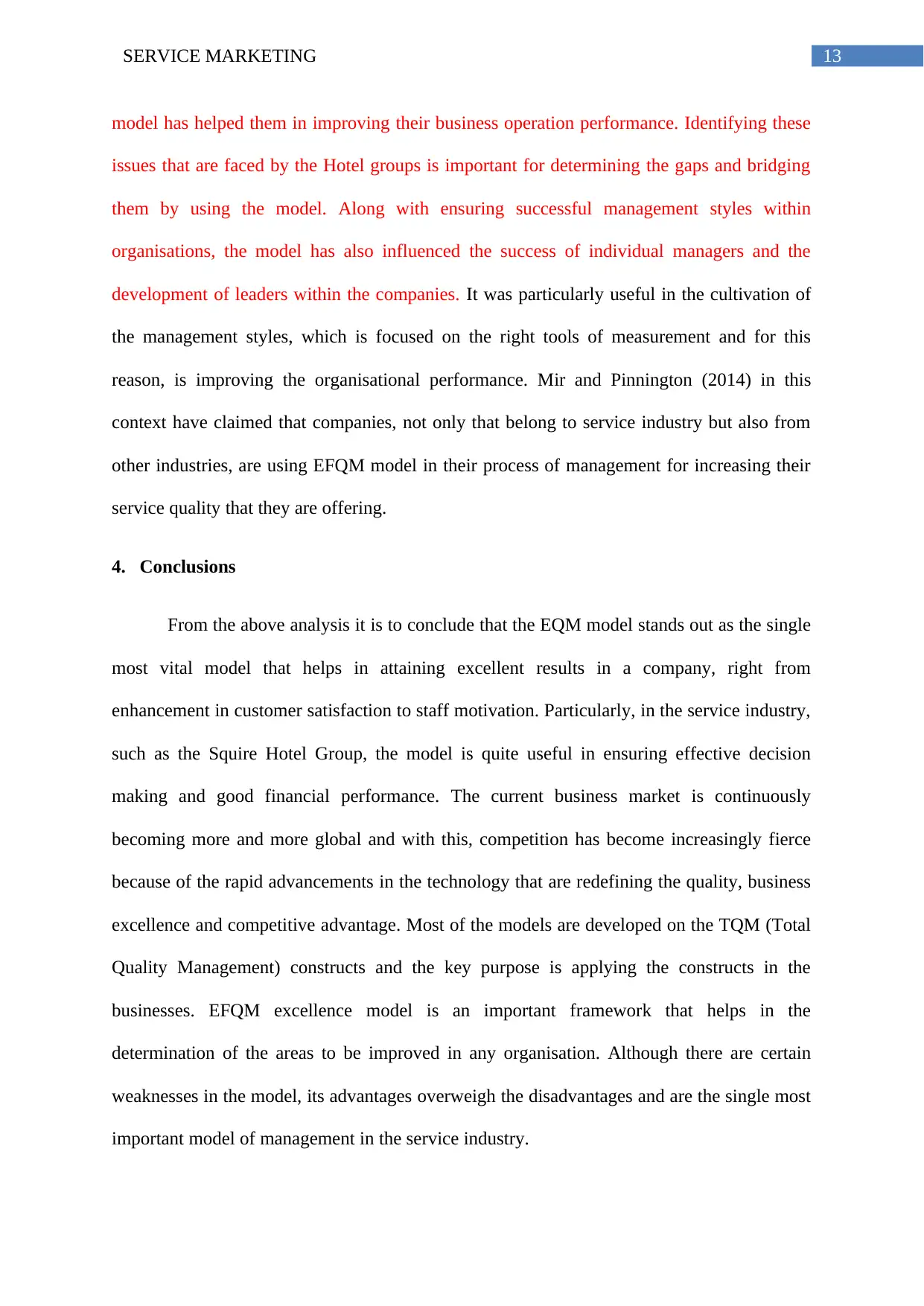
13SERVICE MARKETING
model has helped them in improving their business operation performance. Identifying these
issues that are faced by the Hotel groups is important for determining the gaps and bridging
them by using the model. Along with ensuring successful management styles within
organisations, the model has also influenced the success of individual managers and the
development of leaders within the companies. It was particularly useful in the cultivation of
the management styles, which is focused on the right tools of measurement and for this
reason, is improving the organisational performance. Mir and Pinnington (2014) in this
context have claimed that companies, not only that belong to service industry but also from
other industries, are using EFQM model in their process of management for increasing their
service quality that they are offering.
4. Conclusions
From the above analysis it is to conclude that the EQM model stands out as the single
most vital model that helps in attaining excellent results in a company, right from
enhancement in customer satisfaction to staff motivation. Particularly, in the service industry,
such as the Squire Hotel Group, the model is quite useful in ensuring effective decision
making and good financial performance. The current business market is continuously
becoming more and more global and with this, competition has become increasingly fierce
because of the rapid advancements in the technology that are redefining the quality, business
excellence and competitive advantage. Most of the models are developed on the TQM (Total
Quality Management) constructs and the key purpose is applying the constructs in the
businesses. EFQM excellence model is an important framework that helps in the
determination of the areas to be improved in any organisation. Although there are certain
weaknesses in the model, its advantages overweigh the disadvantages and are the single most
important model of management in the service industry.
model has helped them in improving their business operation performance. Identifying these
issues that are faced by the Hotel groups is important for determining the gaps and bridging
them by using the model. Along with ensuring successful management styles within
organisations, the model has also influenced the success of individual managers and the
development of leaders within the companies. It was particularly useful in the cultivation of
the management styles, which is focused on the right tools of measurement and for this
reason, is improving the organisational performance. Mir and Pinnington (2014) in this
context have claimed that companies, not only that belong to service industry but also from
other industries, are using EFQM model in their process of management for increasing their
service quality that they are offering.
4. Conclusions
From the above analysis it is to conclude that the EQM model stands out as the single
most vital model that helps in attaining excellent results in a company, right from
enhancement in customer satisfaction to staff motivation. Particularly, in the service industry,
such as the Squire Hotel Group, the model is quite useful in ensuring effective decision
making and good financial performance. The current business market is continuously
becoming more and more global and with this, competition has become increasingly fierce
because of the rapid advancements in the technology that are redefining the quality, business
excellence and competitive advantage. Most of the models are developed on the TQM (Total
Quality Management) constructs and the key purpose is applying the constructs in the
businesses. EFQM excellence model is an important framework that helps in the
determination of the areas to be improved in any organisation. Although there are certain
weaknesses in the model, its advantages overweigh the disadvantages and are the single most
important model of management in the service industry.
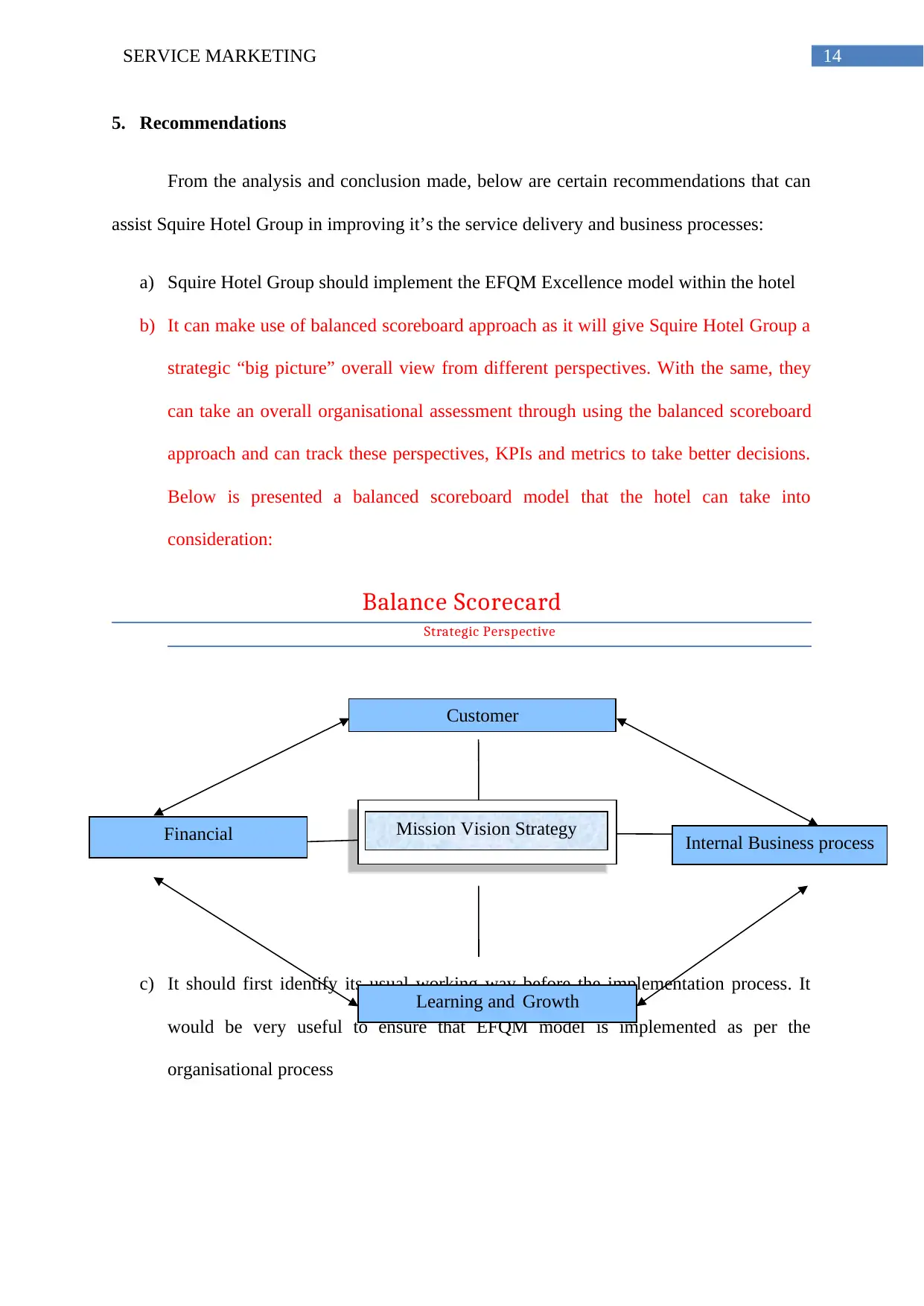
14SERVICE MARKETING
5. Recommendations
From the analysis and conclusion made, below are certain recommendations that can
assist Squire Hotel Group in improving it’s the service delivery and business processes:
a) Squire Hotel Group should implement the EFQM Excellence model within the hotel
b) It can make use of balanced scoreboard approach as it will give Squire Hotel Group a
strategic “big picture” overall view from different perspectives. With the same, they
can take an overall organisational assessment through using the balanced scoreboard
approach and can track these perspectives, KPIs and metrics to take better decisions.
Below is presented a balanced scoreboard model that the hotel can take into
consideration:
Balance Scorecard
Strategic Perspective
c) It should first identify its usual working way before the implementation process. It
would be very useful to ensure that EFQM model is implemented as per the
organisational process
Customer
Internal Business process
Learning and Growth
Financial Mission Vision Strategy
5. Recommendations
From the analysis and conclusion made, below are certain recommendations that can
assist Squire Hotel Group in improving it’s the service delivery and business processes:
a) Squire Hotel Group should implement the EFQM Excellence model within the hotel
b) It can make use of balanced scoreboard approach as it will give Squire Hotel Group a
strategic “big picture” overall view from different perspectives. With the same, they
can take an overall organisational assessment through using the balanced scoreboard
approach and can track these perspectives, KPIs and metrics to take better decisions.
Below is presented a balanced scoreboard model that the hotel can take into
consideration:
Balance Scorecard
Strategic Perspective
c) It should first identify its usual working way before the implementation process. It
would be very useful to ensure that EFQM model is implemented as per the
organisational process
Customer
Internal Business process
Learning and Growth
Financial Mission Vision Strategy
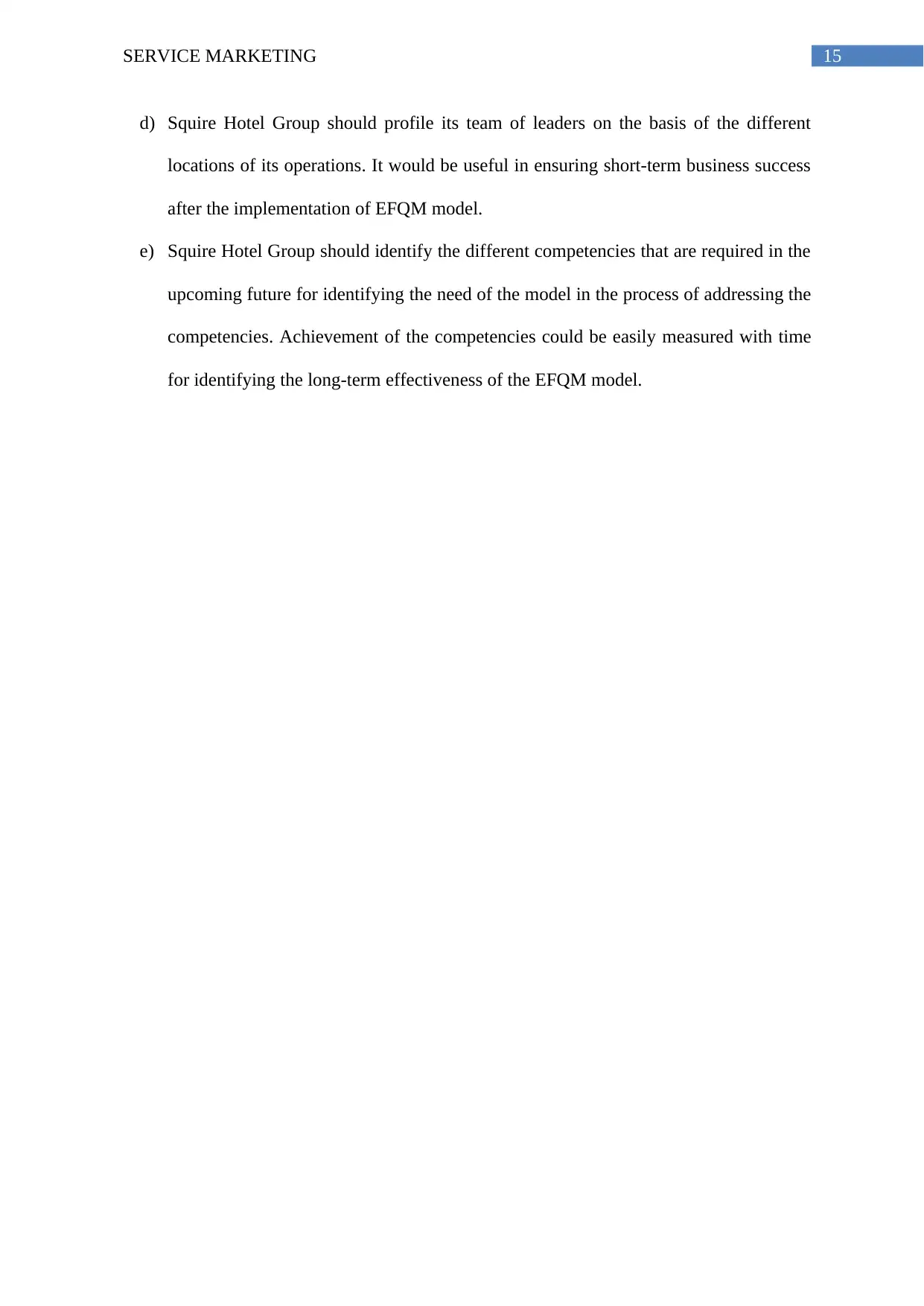
15SERVICE MARKETING
d) Squire Hotel Group should profile its team of leaders on the basis of the different
locations of its operations. It would be useful in ensuring short-term business success
after the implementation of EFQM model.
e) Squire Hotel Group should identify the different competencies that are required in the
upcoming future for identifying the need of the model in the process of addressing the
competencies. Achievement of the competencies could be easily measured with time
for identifying the long-term effectiveness of the EFQM model.
d) Squire Hotel Group should profile its team of leaders on the basis of the different
locations of its operations. It would be useful in ensuring short-term business success
after the implementation of EFQM model.
e) Squire Hotel Group should identify the different competencies that are required in the
upcoming future for identifying the need of the model in the process of addressing the
competencies. Achievement of the competencies could be easily measured with time
for identifying the long-term effectiveness of the EFQM model.
Secure Best Marks with AI Grader
Need help grading? Try our AI Grader for instant feedback on your assignments.
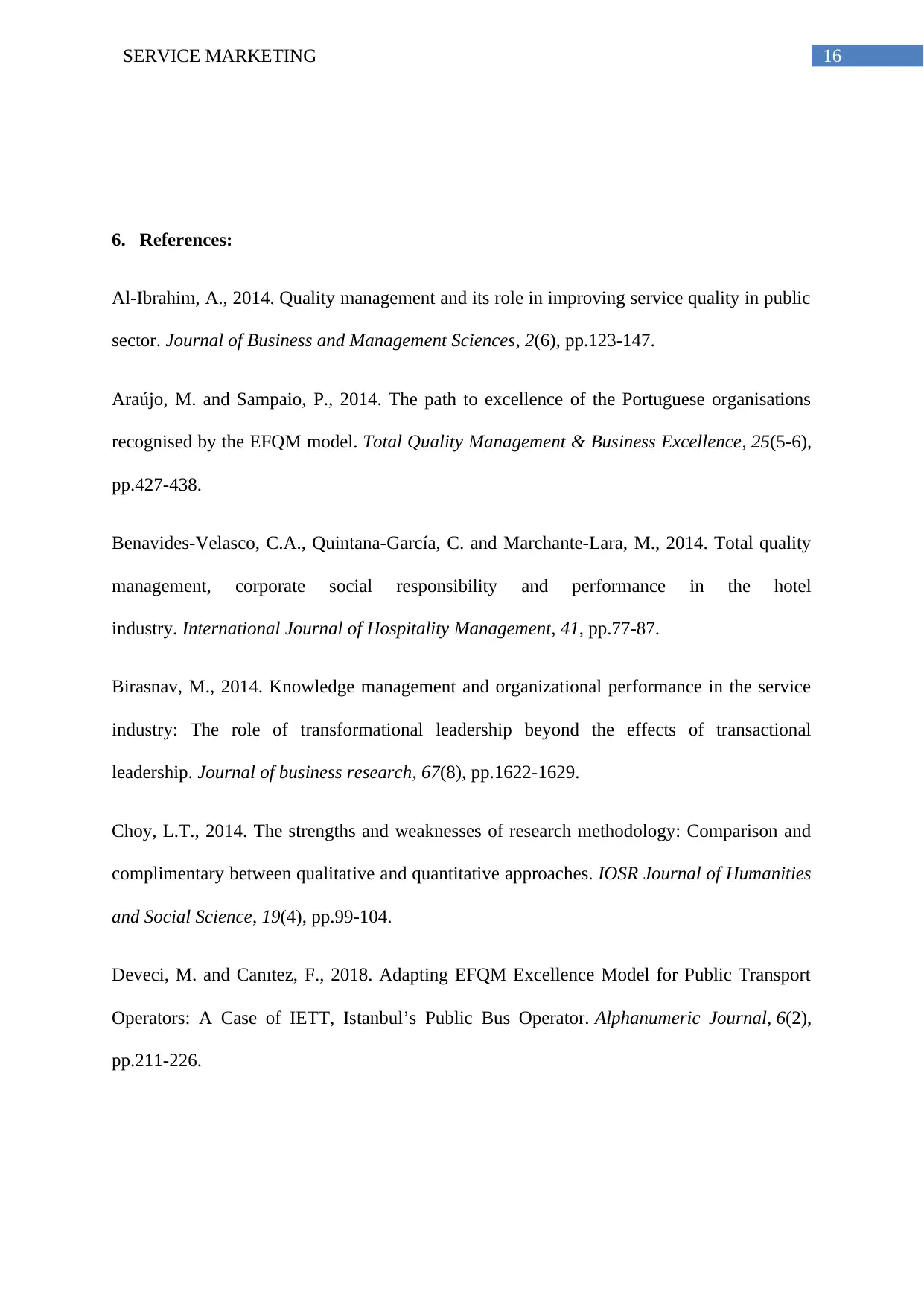
16SERVICE MARKETING
6. References:
Al-Ibrahim, A., 2014. Quality management and its role in improving service quality in public
sector. Journal of Business and Management Sciences, 2(6), pp.123-147.
Araújo, M. and Sampaio, P., 2014. The path to excellence of the Portuguese organisations
recognised by the EFQM model. Total Quality Management & Business Excellence, 25(5-6),
pp.427-438.
Benavides-Velasco, C.A., Quintana-García, C. and Marchante-Lara, M., 2014. Total quality
management, corporate social responsibility and performance in the hotel
industry. International Journal of Hospitality Management, 41, pp.77-87.
Birasnav, M., 2014. Knowledge management and organizational performance in the service
industry: The role of transformational leadership beyond the effects of transactional
leadership. Journal of business research, 67(8), pp.1622-1629.
Choy, L.T., 2014. The strengths and weaknesses of research methodology: Comparison and
complimentary between qualitative and quantitative approaches. IOSR Journal of Humanities
and Social Science, 19(4), pp.99-104.
Deveci, M. and Canıtez, F., 2018. Adapting EFQM Excellence Model for Public Transport
Operators: A Case of IETT, Istanbul’s Public Bus Operator. Alphanumeric Journal, 6(2),
pp.211-226.
6. References:
Al-Ibrahim, A., 2014. Quality management and its role in improving service quality in public
sector. Journal of Business and Management Sciences, 2(6), pp.123-147.
Araújo, M. and Sampaio, P., 2014. The path to excellence of the Portuguese organisations
recognised by the EFQM model. Total Quality Management & Business Excellence, 25(5-6),
pp.427-438.
Benavides-Velasco, C.A., Quintana-García, C. and Marchante-Lara, M., 2014. Total quality
management, corporate social responsibility and performance in the hotel
industry. International Journal of Hospitality Management, 41, pp.77-87.
Birasnav, M., 2014. Knowledge management and organizational performance in the service
industry: The role of transformational leadership beyond the effects of transactional
leadership. Journal of business research, 67(8), pp.1622-1629.
Choy, L.T., 2014. The strengths and weaknesses of research methodology: Comparison and
complimentary between qualitative and quantitative approaches. IOSR Journal of Humanities
and Social Science, 19(4), pp.99-104.
Deveci, M. and Canıtez, F., 2018. Adapting EFQM Excellence Model for Public Transport
Operators: A Case of IETT, Istanbul’s Public Bus Operator. Alphanumeric Journal, 6(2),
pp.211-226.
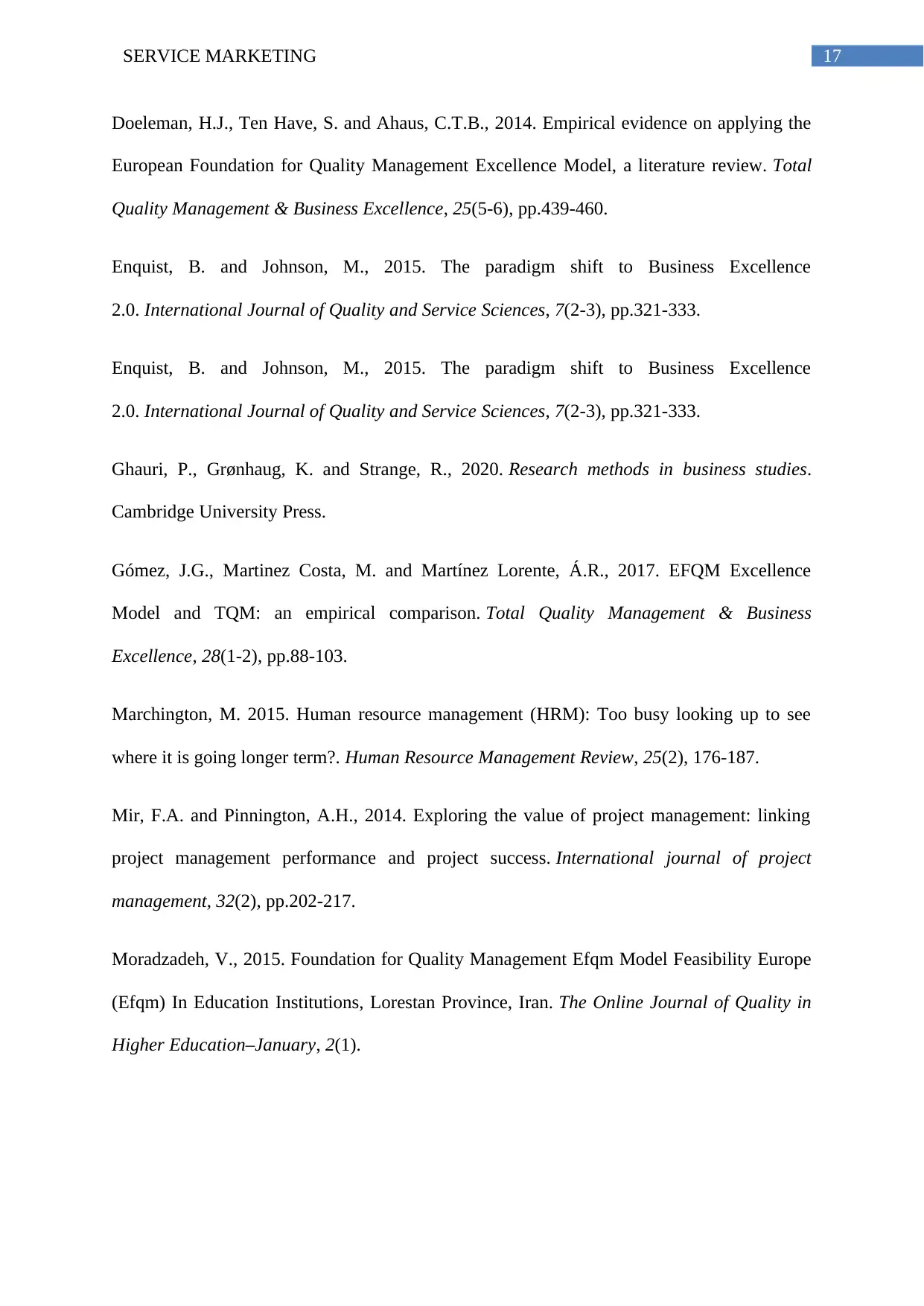
17SERVICE MARKETING
Doeleman, H.J., Ten Have, S. and Ahaus, C.T.B., 2014. Empirical evidence on applying the
European Foundation for Quality Management Excellence Model, a literature review. Total
Quality Management & Business Excellence, 25(5-6), pp.439-460.
Enquist, B. and Johnson, M., 2015. The paradigm shift to Business Excellence
2.0. International Journal of Quality and Service Sciences, 7(2-3), pp.321-333.
Enquist, B. and Johnson, M., 2015. The paradigm shift to Business Excellence
2.0. International Journal of Quality and Service Sciences, 7(2-3), pp.321-333.
Ghauri, P., Grønhaug, K. and Strange, R., 2020. Research methods in business studies.
Cambridge University Press.
Gómez, J.G., Martinez Costa, M. and Martínez Lorente, Á.R., 2017. EFQM Excellence
Model and TQM: an empirical comparison. Total Quality Management & Business
Excellence, 28(1-2), pp.88-103.
Marchington, M. 2015. Human resource management (HRM): Too busy looking up to see
where it is going longer term?. Human Resource Management Review, 25(2), 176-187.
Mir, F.A. and Pinnington, A.H., 2014. Exploring the value of project management: linking
project management performance and project success. International journal of project
management, 32(2), pp.202-217.
Moradzadeh, V., 2015. Foundation for Quality Management Efqm Model Feasibility Europe
(Efqm) In Education Institutions, Lorestan Province, Iran. The Online Journal of Quality in
Higher Education–January, 2(1).
Doeleman, H.J., Ten Have, S. and Ahaus, C.T.B., 2014. Empirical evidence on applying the
European Foundation for Quality Management Excellence Model, a literature review. Total
Quality Management & Business Excellence, 25(5-6), pp.439-460.
Enquist, B. and Johnson, M., 2015. The paradigm shift to Business Excellence
2.0. International Journal of Quality and Service Sciences, 7(2-3), pp.321-333.
Enquist, B. and Johnson, M., 2015. The paradigm shift to Business Excellence
2.0. International Journal of Quality and Service Sciences, 7(2-3), pp.321-333.
Ghauri, P., Grønhaug, K. and Strange, R., 2020. Research methods in business studies.
Cambridge University Press.
Gómez, J.G., Martinez Costa, M. and Martínez Lorente, Á.R., 2017. EFQM Excellence
Model and TQM: an empirical comparison. Total Quality Management & Business
Excellence, 28(1-2), pp.88-103.
Marchington, M. 2015. Human resource management (HRM): Too busy looking up to see
where it is going longer term?. Human Resource Management Review, 25(2), 176-187.
Mir, F.A. and Pinnington, A.H., 2014. Exploring the value of project management: linking
project management performance and project success. International journal of project
management, 32(2), pp.202-217.
Moradzadeh, V., 2015. Foundation for Quality Management Efqm Model Feasibility Europe
(Efqm) In Education Institutions, Lorestan Province, Iran. The Online Journal of Quality in
Higher Education–January, 2(1).
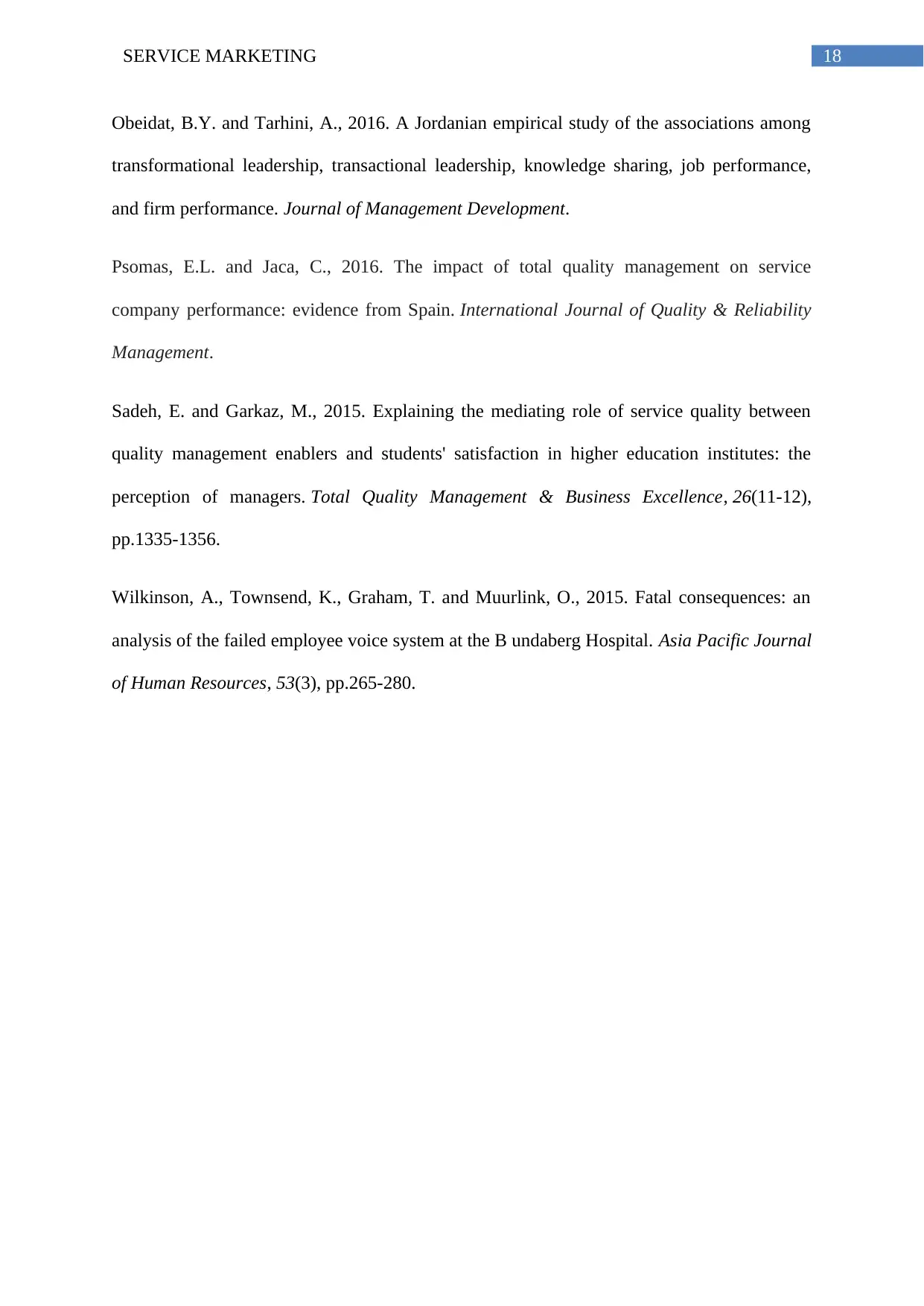
18SERVICE MARKETING
Obeidat, B.Y. and Tarhini, A., 2016. A Jordanian empirical study of the associations among
transformational leadership, transactional leadership, knowledge sharing, job performance,
and firm performance. Journal of Management Development.
Psomas, E.L. and Jaca, C., 2016. The impact of total quality management on service
company performance: evidence from Spain. International Journal of Quality & Reliability
Management.
Sadeh, E. and Garkaz, M., 2015. Explaining the mediating role of service quality between
quality management enablers and students' satisfaction in higher education institutes: the
perception of managers. Total Quality Management & Business Excellence, 26(11-12),
pp.1335-1356.
Wilkinson, A., Townsend, K., Graham, T. and Muurlink, O., 2015. Fatal consequences: an
analysis of the failed employee voice system at the B undaberg Hospital. Asia Pacific Journal
of Human Resources, 53(3), pp.265-280.
Obeidat, B.Y. and Tarhini, A., 2016. A Jordanian empirical study of the associations among
transformational leadership, transactional leadership, knowledge sharing, job performance,
and firm performance. Journal of Management Development.
Psomas, E.L. and Jaca, C., 2016. The impact of total quality management on service
company performance: evidence from Spain. International Journal of Quality & Reliability
Management.
Sadeh, E. and Garkaz, M., 2015. Explaining the mediating role of service quality between
quality management enablers and students' satisfaction in higher education institutes: the
perception of managers. Total Quality Management & Business Excellence, 26(11-12),
pp.1335-1356.
Wilkinson, A., Townsend, K., Graham, T. and Muurlink, O., 2015. Fatal consequences: an
analysis of the failed employee voice system at the B undaberg Hospital. Asia Pacific Journal
of Human Resources, 53(3), pp.265-280.
1 out of 19
Related Documents
Your All-in-One AI-Powered Toolkit for Academic Success.
+13062052269
info@desklib.com
Available 24*7 on WhatsApp / Email
![[object Object]](/_next/static/media/star-bottom.7253800d.svg)
Unlock your academic potential
© 2024 | Zucol Services PVT LTD | All rights reserved.





